#i just don't have the ability to create a whole story
Explore tagged Tumblr posts
Note
Hello! I apologize for any awkward expressions, as I'm not American and not very proficient in English.
I wasn't part of the 9-1-1 fandom and watched it whenever I had time. It was a light show for me, but while watching 9-1-1, I hoped that Buck would find a partner to settle down with and be happy. (And I never felt even 1% of romantic feelings between Buck and Eddie.) When Buck broke up with Taylor, I understood the reason but felt regretful. After that, Tommy appeared as a meaningful LI. I sincerely cheered for Buck, seeing him happy.
I had high expectations for S8, but in 801, Tommy appeared briefly, and until 804, no one mentioned Tommy, which I found strange. Then I watched 805 and thought Henren's story was forced, but I liked Buck and Tommy's story. Then I watched 806, and... Buck and Tommy can break up. If it had been for a convincing reason like with Buck and Taylor, I would have been sad but understood. However, I couldn't understand the story in 806 at all, and the characters felt unfamiliar, as if they weren't the characters I knew. And the interviews with Tim and OS gave me trauma after enjoying watching 9-1-1 all this time.
Only Lou understood and empathized with me. I didn't know Lou and didn't remember Tommy from S2. I supported Buck and Tommy solely because Buck was happy... Especially OS's interview made me feel like Buck and Tommy were ignored as if they didn't exist. I don't usually have expectations for actors, but I was really disappointed. So, even though I subscribed to Disney+ annually because of 9-1-1, I no longer watch 9-1-1. I know that my not watching won't change anything. And I know that Tim doesn't have the ability to create good, creative stories. Knowing that Buck will just keep running in the same hamster wheel, I really lost expectations for Buck. Of course, knowing that other 9-1-1 characters besides Buck will also run in slightly different hamster wheels without development, I lost interest in the show itself.
Furthermore, I was honestly disappointed with the production team and the broadcasting company for not thinking of protecting the actor who was insulted and attacked in all sorts of ways just because they were Buck's LI. In the country where I live, if such a situation occurred, there would have been an official message from the broadcasting company and production team to stop the attacks and hatred.
I'm sorry for sending such a negative and pessimistic message. I wanted to confide in someone. Even if Tommy doesn't appear again, I plan to continue enjoying BuckTommy content on Tumblr and AO3, but I really miss the time when I was looking forward to and waiting for S8.
Hi, Nonnie! Sorry for taking a bit, physical therapy is kicking my ass rn lmao (kids do not tear your meniscus)
Okay by points. First of all - your English was perfect, don’t sweat it. English is my third language so Iunderstand where you come from, but you’re good!! Now:
you🤝me with this whole post. You were on my mind fr because I do share all of your thoughts.
Perhaps confession time: I liked Taylor! I ultimately understood why it wouldn’t work between Buck and her, but I liked her and I thought they were really cute. I was sad to see her go (although I’m glad by leaving we were able to eventually get Tommy)
Season 8 is the perfect illustration of something I’ve been thinking about 911 for a while - it is the land of missed potential. I’ve gone about it a few times so I won’t go over it again, but Season 8 is the perfect example of having lots they could do yet refusing to attempt to do it.
Your point on the break up is 100%. I would’ve actually understood and accepted it if it made sense in a larger scale, or if we had been introduced to it better. As it is, you do understand Tommy’s motives, but only if you look at the episode. Meaning: everyone acted so out of character during 806, it seemed like a different show. Therefore the break up (to me) does not make sense in a broader, more general view.
Your point on interviews: yeah I get it, sadly. The interviews left a sour taste in everyone’s mouth, because it did seem like Lou was the only one who truly cared for the couple and its fans. And for everyone who had been harassed for months for liking them, the nonchalant attitude of nearly everyone felt cruel and hurtful. It’s more than normal that many people felt like stop watching the show after it (me included). It does seem like OS has started to realize how big Bucktommy actually was and how liked they still are. So, progress? But it feels too little too late. Idk.
I also understand it does feel bad to see how they’ve ignored the bad treatment LFJr has received. Ofc we lack a lot of context (meaning: perhaps Lou himself asked them to ignore it, perhaps he did have a lot of support BTS), but the fact is that they let a group of deranged ‘fans’ bully and threaten an actor, and did nothing. No, instead it very much felt like those fans were being rewarded. It’s normal for us to not want to support that. I know I feel uncomfy with the idea of doing so.
We are lucky (infinitely lucky) that the Bucktommy fandom is filled with truly lovely and amazing people - people that are lovely to read, discuss with, and enjoy their art from!! If 911 doesn’t got my back, I know the BT fandom does ♥️
I hope you can continue to enjoy fandom life, anon! Ultimately they cannot take away what we enjoy!
My inbox is open for ranting, venting, giving opinions and confessions! And if you do not want them publish, please say so in your message 🥰 it’s cool with me, but I do need to know!
Take care <3
39 notes
·
View notes
Text
So, last night I was thinking about FF14 and Skyrim again.
Specifically, my feelings of "I played this game all day - do I feel like I actually did anything today, or not".
If I manage to play Skyrim for basically a full day (instead of some random burst of an hour), I usually feel like I've "advanced the story" of that character, gotten better gear, established the character's personality a little bit (doing X instead of Y, prioritizing this quest over that, commentary through regular gameplay, etc).
So I don't necessarily feel like I "did a lot of things today", but it does feel like there's an "accomplished" feeling, kind of.
If I play FF14 a full day, I feel like-... It feels a bit as if I've watched a really long movie (especially if I played MSQ)? It's a sometimes-good movie, so I don't necessarily regret it, but... that's it. Between the queues for dungeon-diving and travel-time, a lot of the gameplay really amounts to "watch a cutscene".
So, I learn new stuff about FF14-lore, I might get inspired into creating a fancy new outfit for a class, and... a few numbers go up? The aftermath of playing FF14 really does feel as if I've spent the day watching a weirdly prolonged movie.
#a part of me keeps making annoyed noises and saying ''just buy the fucking game already''#bcs then i'll have bigger caps available. more outfits. etc. but then i remember that it's a subscription.#a subscription that will lock this character forever if i stop paying the fee. and suddenly i REALLY don't wanna.#and the fact that i keep feeling as if ''this is a movie - not a chance to create new and interesting characters''?#it definitely pushes ff14 closer towards something like no-character-creation The Witcher and actual-railroading Divinity 2#and... yeah. mmos aren't exactly famous for letting you develop ''interesting characters'' in the story or whatever#but that's usually bcs there isn't a LOT of story. and it's usually very ''start a new character''-friendly#which ff14 is very much designed AGAINST (you can do all the classes as one character. msq is really fucking long. etc)#so despite how deeply invested ff14 is in its own story. it almost feels like the player isn't allowed to INTERACT with it.#skyrim has many faults (many many faults) in its story. but usually there's an ability to pick and choose what parts to interact with.#i could play as a thief and NOT join the thieves guild. i could ignore the civil war. or alduin. or miraak.#i can even make a choice sometimes to pick a side (dawnguard/vampires. empire/stormcloaks.)#there are even some daedric quests that allow for ''murder the innocents or get cool new item''-choices.#do those choices matter a lot as far as gameplay is concerned? not really. but for a character-story? it's incredible.#so ff14 has this whole world of amazing things. and you HAVE to play through msq to see it.#and msq doesn't really allow you to be anything other than ''heroic and steadfast warrior'' with MAYBE a bit of flavor-text mixed in.#which would be fine in most mmos. bcs the story is such a small part of the game. but ff14 has a FUCKTON of story.#so... you get to choose what your character looks like. and then you get to see them in lots of cutscenes.#bcs you don't really have any control over WHO this character of yours really is. just what they're wearing.#so yeah. it ends up feeling a lot like i've just watched a movie. not done something ''creative'' for character-building.#ff14#skyrim#personal stuff#video games#rants
0 notes
Text
you know what really grinds my gears?
okay, bear with me: so as you may know, harry houdini and arthur conan doyle were friends, at least for a while.
by the early 1920s, both arthur conan doyle and acd's wife jean, aka lady doyle, believed whole-heartedly in spiritualism, talking to ghosts and all of that. (sidenote: this was of course right on the heels of a devastating world war and a devastating pandemic, both of which had created a huge population of grieving people, so spiritualism was having a moment.)
lady doyle sincerely thought she had the ability to go into a trance state and pass along messages in writing from the dead. she offered to do this for houdini. houdini agreed.
lady doyle attempted to channel houdini's late mother. she basically drew a cross at the top of the paper and filled it with generic platitudes addressed to "harry." houdini's mom was jewish and didn't talk like that, so houdini knew the jig was up, even if lady doyle didn't. but not wanting to make the situation awkward, he kind of went along with it to their faces.
then acd decided to publish a glowing account of the seance, and since both he and houdini were super famous, it got a lot of attention, and letters started pouring in for houdini, asking if this was true. ultimately, houdini couldn't lie about it. so he essentially said, like, "yeah, i think lady doyle THINKS she can talk to ghosts but she absolutely can't." and it ruined his friendship with acd forever.
and then of course a lot of the people running seances weren't even well-intentioned like lady doyle, they were just simple charlatans taking advantage of traumatized people mourning loved ones. in houdini's youth, he and his wife had traveled the carnival circuit where he did an act pretending to commune with spirits, so he knew all the tricks of the trade AND he had lingering guilt over having done this, AND he was infuriated by this increasingly popular wave of con artists so he decided to assemble a team of anti-grifting grifters and together they went on the road exposing whichever spiritualists were preying on the locals.
houdini's best agent was a young woman named rose mackenberg, who donned disguises to visit the fraud de jour and then importantly sussed out what non-supernatural thing was actually happening, and then houdini would demonstrate the techniques onstage to packed audiences.
(if you want to know more, check out episode 175, "ghost racket crusade" of the podcast Criminal or read Tony Wolf's book The Real-Life Ghostbusting Adventures of Rose Mackenberg.)
but yeah, what really gets my goat is that all this happened and as far as i know, we still don't have like four seasons of a Leverage-style historical procedural about rose mackenberg and the rest of the crew having adventures in the 1920s as they unmask craven hucksters all over the united states. (what we do have, apparently, is one season of a show called "houdini and doyle" which is about the oddball friendship of two contrasting men solving sometimes-actually-supernatural mysteries, and whose premise does i think at the very least a real disservice to houdini's whole quest and also totally erases rose, who is arguably the most interesting part of this story to me.)
i am just steamed about this. steamed.
11K notes
·
View notes
Text
Writing Tools for Planning Your Story
I've tried tons of writing apps and sites, so you don't have to. Here's a list of free sites to plot out your novel, with my review and some images of how I use it.
Milanote
Milanote is like having a giant pinboard with folders. You can upload anything onto it [yes even your main doc] and then draw over it or connect things with lines and arrows
Milanote lets you add up to a hundred things for free, not including drawing. This is one of the downsides of the site as I've found myself reaching that limit recently.
For me, the best part is being able to draw over stuff, and the color swatches.
Milanote is a lot less structured than other sites I've used, and personally, I don't think their templates are worth using.
8/10 overall, Milanote is what I mainly use. Here are some pics of how I use it:
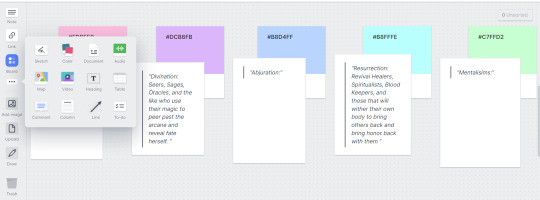
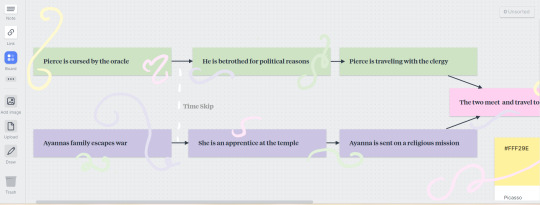
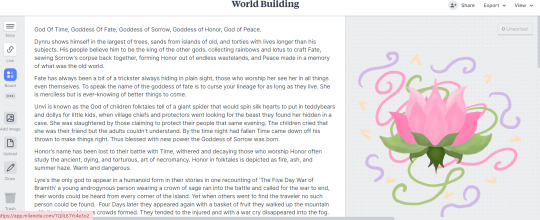
Miro
Miro is a flowchart website mainly used for corporate jobs, however, it can be a great plotting tool for that reason
Miro has a lot of great starter templates if you are looking for a more structured freeform experience. It also comes with a blank page as well.
Unfortunately, I'd argue that it's a bit of a hard tool for beginners to use without a template, I've learned copy-paste is my best friend with Miro the hard way.
It's much better than most platforms at making timelines though.
It has a limit of three boards which is a bit disappointing but overall, I think it's worth the try.
5/10 Miro is very middle of the road for me due to the limited ability to customize things and the free limit. Here are some pics:
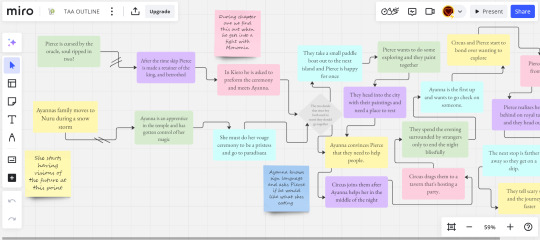

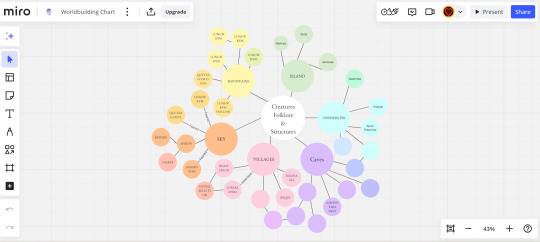
[I wrote that part weeks ago, I am now fully using Miro and believe it's the best for making timelines and charts, I just wish it let me make more boards 8/10]
Hiveword
This might be someone's jam, I can't really say it's mine though.
First off, the unpaid version is really just a few boxes saying "Write a summary here." which makes it just not worth it in my opinion
There really isn't any way to customise things which is my favorite part of most of these softwares
I've barely used this, so maybe there's something I'm missing but
1/10, Just use Google Docs at this point, here's a couple pics
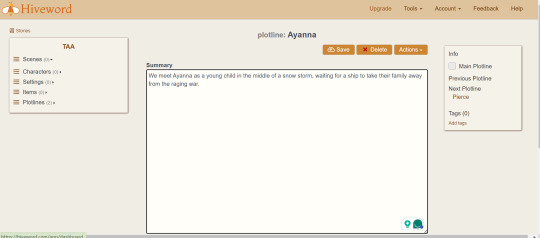

World Anvil
People like this software, it's mainly used for tabletop, which is just a different way of writing adventure, and I've seen it recommended by authors.
Unfortunately, I'm going to disagree with a lot of people and say it's hard to use and isn't even really good at plotting.
I may be biased on this one as every time I've tried to use it in the past I've struggled. However, it seems like another just write it in a document and create a folder.
I'd say it's closer to an organizing tool, but even then just use something else.
3/10, I have nothing to say about it but maybe you'll enjoy it, all here are two photos
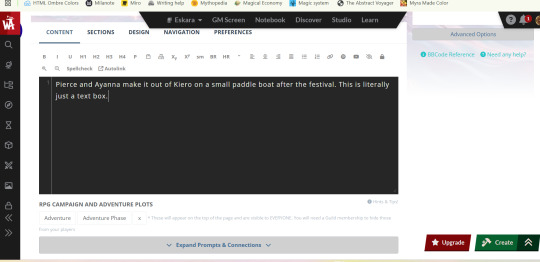

Campfire
This is the one I think I've heard the most about, but have never actually tried.
right off the bat, I'm going to say this is 100% worth it, you'll see at the end with the photos but this is like if Miro and World Anvil had an organization baby.
It's extremely easy to understand, and it makes timelines, it's more for writing your whole book but idk about that yet.
7/10, its themes are really pretty but it limits how much you can do to 20 I believe. Here are the photos
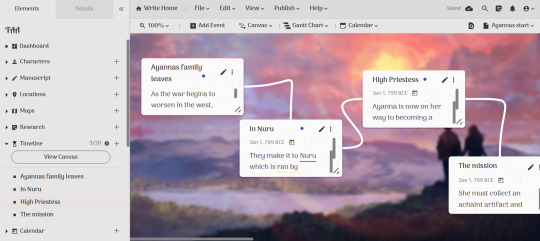
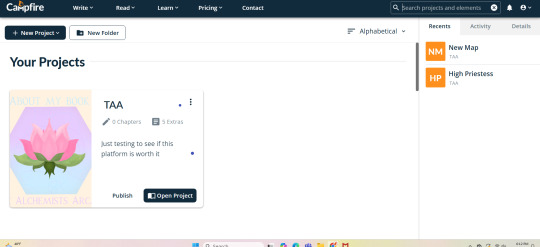
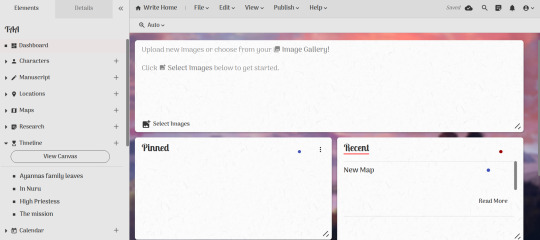
That's all for now, honestly, I think you should use Miro if you are looking to plot things out, and Milanote if you want to collect and organize your thoughts for writing, as that's what I do. Obviously what I like won't be for everyone, but hopefully, this helped you see some options
#writeblr#writers on tumblr#creative writing#worldbuilding#plotting#writing advice#writing tool#writing#writers#writing plans
1K notes
·
View notes
Text
hey all, I know we're all inundated with fundraisers right now, but I want to draw attention to a brand-new fundraiser for my friend tawfeek @gaazafamily . the fundraiser is linked above. unfortunately his last fundraiser manager turned out to be untrustworthy and stole his funds, so he is starting again at 0. his old fundraiser was vetted here on tumblr (on one of his old accounts, which has now been deleted) (vetting link 2)—it was managed by his cousin feras, who stole the funds.
here is a post linking the old and new fundraisers.
I can also personally say that I've been speaking to him semi-regularly for months about his situation. we have been speaking almost every day except for the period of time when he was without a phone. through this time he has changed tumblr accounts but has remained speaking to me on the same instagram account the whole time.
because he does not have many other contacts outside of palestine, and fundraiser sites don't work within palestine, I am now managing his new fundraiser. I don't know exactly how to prove that I am trustworthy, but you are welcome to peruse the 8-year history of my blog to at least prove that I'm not an opportunistic scammer. I'm also happy to provide my instagram (also going back many years) to anyone who asks.
regarding platforms, a trusted contact who manages several palestinian fundraisers referred me to spotfund, as they have a less lengthy verification process and they are less likely to unexpectedly shut down fundraisers compared to gofundme.
for any questions about logistics, please send me an ask or a DM and I will answer to the best of my ability!
updated to add: novella sale - from now until january 14th, 2025, I am going to be offering my novella at no cost for anyone who donates at least $4 to this fundraiser. DM me a screenshot of your donation and I will share the itch.io coupon link or ko-fi code with you, whichever you prefer.
442 notes
·
View notes
Text
The 141 have a ridiculous run of inside jokes that is continuosly ruining their lives, such as;
1.) If someone says, "You love it really," to you, you immediately have to agree with them, no matter what the circumstances. Otherwise, you lose the ability to do it back. This has resulted in many weird fake confessions, including one time in which Soap got fed up with people making your mom jokes at him and went on a rant about it. Ghost glanced at him in front of a room full of cadets and just went, "You love it really, though," and Soap almost died as he sadly nodded and replied, "Yeah, I do."
2.) If something even remotely sexual sounding is said about you, you must always say, "You're damn right I do/am/will," back. This backfired once when they were in a defreif and Price said something about Gaz "coming through the back door" and Gaz, without think, winked and replied "You're damn right I did," In front of everyone and got in trouble for mild insubordination. (The others almost died laughing as he realised what he'd done, who he'd done it to, and who he'd done it in front of (aka Price's bosses))
3.) When talking about Roach, they will always act like he's died. He hasn't, but none of them can stop the joke, and it always makes all of them crack up, even Roach. This once caused major panic, as once when Ghost was discussing their latest mission with Laswell, he said, "It was fine because Roach - God rest his soul -" and Laswell had about two minutes where she thinks Roach has dropped dead and she didn't fucking know.
4.) They will always make up bad stories for how they met Ghost, if anyone ever asks. It doesn't matter what the truth is, or who they're speaking to, when asked, all three of them will reply with some made up, overly dramatic or down right boring story on how they met. These stories ranged from Ghost, saving them from a shark attack (Gaz), Ghost selling them assorted drugs as a teenager (Roach), and most devastatingly is when Soap told a distant relative of his that he met Ghost after "finding him with my older brother, behind his wifes back" he does not have an older brother, and so there is no wife.
5.) They always reference the "Malibu incident." None of them have ever been to Malibu. Nothing bad has ever happened there, but now they've created a whole conspiracy in the British Army about a coverup that happened in Malibu. Price knows about this one and finds it endlessly funny, so he goes along with it, never directly mentioning it but refusing to deny it when someone asks. If anyone ever asks about the details of it, they just give a deadpanned look as if the other person should already know and say; "Don't make me say it." There are rumours. Like, a lot of rumours.
6.) Roach claps every time someone says, "I'll be there for you" because once he clapped at the wrong time during the friends intro and had been paying the price ever since. It doesn't happen often, but sometimes you'll just hear him clapping - not even in the tune to the friends theme. Just random clapping. If any of the others hear it, they almost always reply with "That's a fuckin' joke" in a really disappointed tone. It's confused a lot of people.
#call of duty#cod mw2#john soap mactavish#simon ghost riley#kyle gaz garrick#gary roach sanderson#john price#kate laswell#they spend far too much time together#so their humour has kind of melded together to make their own goddamn language that nobody else ever understands#and they can't explain it either#because it always takes too long and by the time theyre done its not even funny#so they just look crazy to everyone#price knows about most of these but absolutely refuses to take part in them#except for malibu#because he actually finds that one funny#task force 141#cod 141#shit talker talks
2K notes
·
View notes
Text
One Piece means a lot to me as a disabled person, which I think would be pretty surprising to anyone who only has a surface understanding of it. The supposed central theme of "follow your dreams" would be pretty alienating to someone like me, right? It really, really would be, if that's what it was actually about.
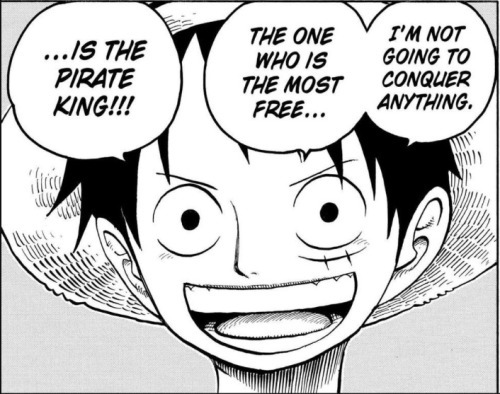
However, that ignores that Luffy's dream is to be the most free person in the world. And to attain that goal, the first thing he does is find friends to live life with. Over and over again, from the very beginning, he takes on their burdens, all in the name of being the most free.
Do you see what that would mean to me, as someone who needs more help to get by than is considered culturally normal, to the point that it puts me in a whole socially manufactured category of "other"? Not to mention, because of the infantilization of me due to that category, because of being forced so squarely into the "cared for" role, taking care of other people is deeply meaningful and empowering for me. However, the myths of independence and universal natural ability often make it emotionally difficult for my loved ones to accept that care.
The fear of asking for help, the guilt of being cared for, the weight of someone you loved who could not be as free as you, the insecurity of not contributing enough, the fear that you were born wrong, the self-hatred that says you are not worth the effort, Nami Sanji Zoro Usopp Robin Chopper Ace they all explore the painful obstacles to free connection. Through deeply impactful stories that weave beautifully into the larger one.
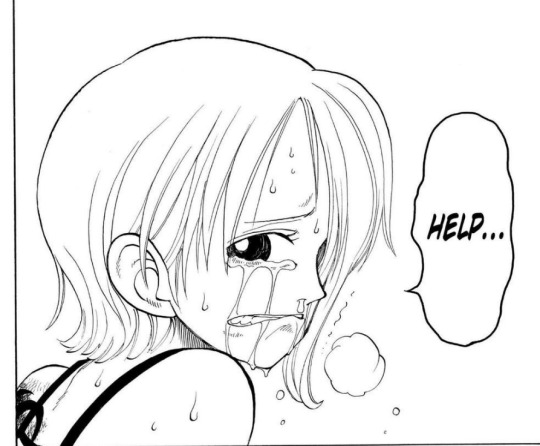
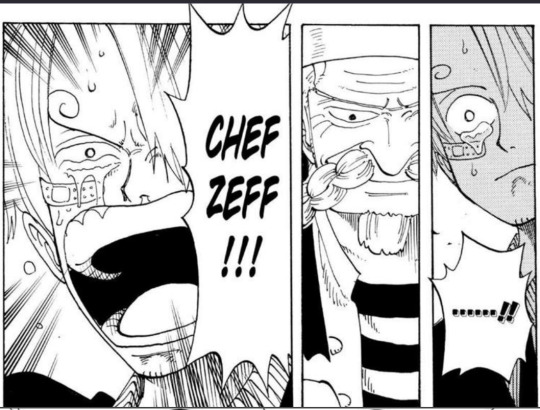
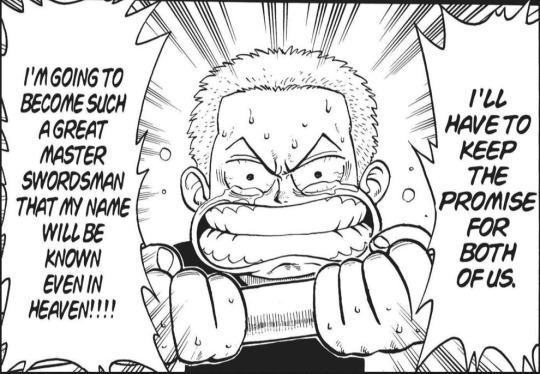
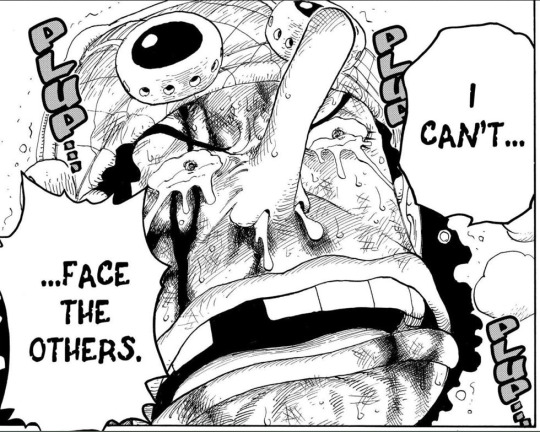
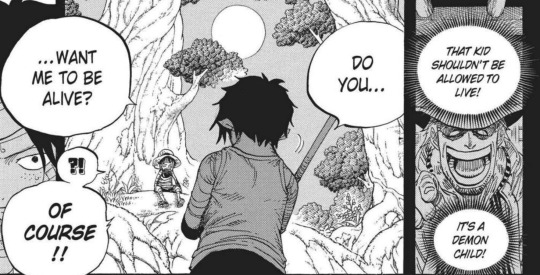
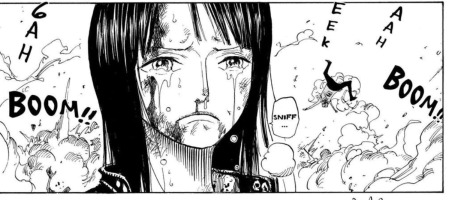
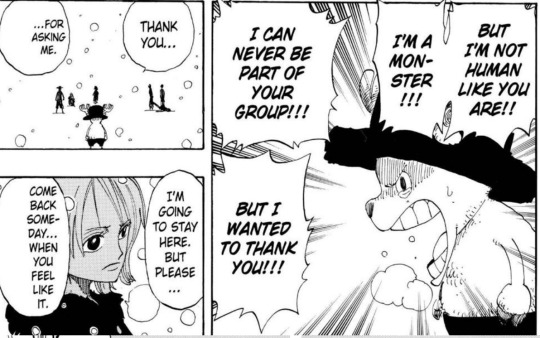
All centered around this one person who views loving them and living with them and carrying them as essential to his freedom. Who cannot, for countless reasons, live a normalized life of Structured Relations. Who views exploring and bickering and suffering and laughing with them as the ideal way to live. Who repeatedly puts his life and limbs on the line to do so.
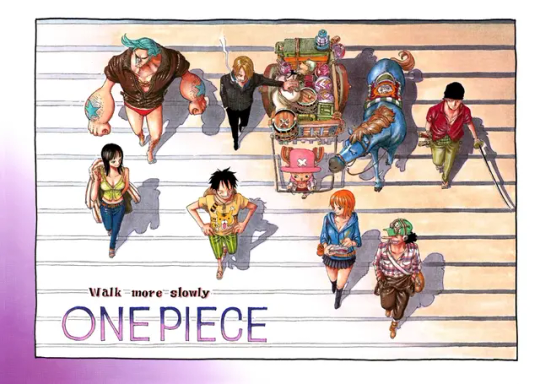
To me, it is an ultimate privilege and freedom to carry other people's burdens. To care for them and live with them. This is central to my whole perspective, and is completely informed by my life experience as a disabled person. I rarely see it reflected back to me. Let alone as powerfully and beautifully as Luffy does.
Nor the other half of it, of wanting to create this life with people in ways that aren't socially normal or approved. Of creating many varied lifelong intimate relations among equals, rather than conforming to the expectation of choosing One Person to live life with and then Creating More.
The utter lack of roles and norms is just as integral and powerful to the exploration of freedom and connection! It is meaningful to me as a queer person, yes, but even this is deeply influenced by my disability. I could never be that One Person, despite everything I have to offer, there is logistically far too much that I cannot do to be someone's equal partner in this society that demands so much from all of us. However, even if I could, I wouldn't want to! It doesn't make any sense to me to only have two people navigate life together on such intimate terms. Can't the demands of society be more comfortably met in a group? Isn't life more fun that way?
We are taught that we can and must do everything ourselves, I just happen to be one of the people that never had a chance to buy into that lie. To learn very early not just the necessity of interdependence, but the joy in it. To learn that it is most comfortably lived with more people involved. To me, close relationships are, love is, a natural extension of that understanding. One Piece celebrates interdependence constantly from the start, while never pretending that it is always easy.
The obstacles to free connection that I mentioned before, they are interspersed throughout the story, and they are always met with "I do the things you can't do, and you do the things I can't do." With, "Of course I can't use swords you dumbass! And I can't cook either! I don't know a damn thing about navigation! And I can't lie!"
These are intentionally impactful moments, and they define the series. I found it very fitting that the Fan Letter focused on a character who was empowered by Nami to feel free and live adventurously despite not being the most physically capable. The character is able by our definition, but the story is very affirming in a disability way, and it was extremely One Piece. I loved how it acknowledged this deep connection between One Piece and the lived reality of disability and celebrated it as integral as it is.
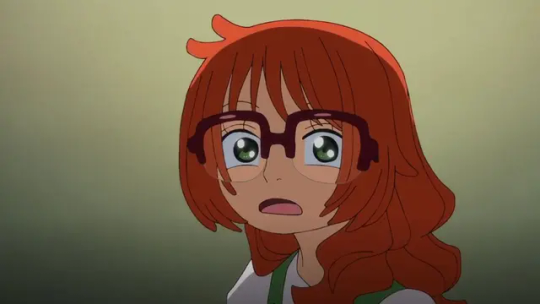
I also believe that absolutely none of this is intentional. It is simply an earnest exploration of human relationships, emotions, and behavior, and it naturally arrives at a radical and disability-affirming viewpoint. Because we are the monkey wrench in the deeply unhealthy (lol) and dominant line of thinking that independence is all. So naturally anything that also disputes that thinking has a disabled-perspective feel to it. The best part is how much it doesn't give a fuck! One Piece is aggressively against conformity in human relationships, in a way that is hard to find in our new world of self-conscious authors.
It's also, you know, the worst part, in terms of all the outrageous bigotry and offensive character design, but god damn it if it doesn't elevate the good parts to unbearable heights. Even the bad character designs can sometimes be more impactful for their intentional "ugliness", when those characters are inevitably taken seriously despite their appearance and the stereotypes they play on, it hits hard every time. I do have a simple hatred for many choices, there is no pay-off for much of the awful problems in numerous character designs and dialogue. But no matter how upset I can be by those things, in the end they can't succeed in pulling me away from One Piece. It's just so crazy and unique and great and terrible and beautiful and I LOVE IT.
#WOOF. FINALLY FINISHED THIS POST.#I am basically always trying to articulate this. I've written so many long posts.#but fan letter got me to give it my best effort once more. ITS SO GOOD!!! YES THAT'S WHAT IT'S ALL ABOUT!!!!#i love especially the meaning of it being USOPP who finds mimi (my headcanon name for nami's fangirl) and gives her directions.#he who most recently and directly struggled with his lack of ability. she doesn't even know about that.... ough....#YOU DON'T HAVE TO BE THE MOST CAPABLE TO GO ON ADVENTURES!!!!!!!!!!! GO MIMI!!!!!!!!!!!!!!!#my posts#one piece#op fan letter#opfl#one piece meta#op meta#one piece analysis#op analysis#i guess lol i hope this reaches some people despite you know. being. how i am.#(intense and clearly having gotten very deep into my particular perspective after endless verbalizing)
221 notes
·
View notes
Text
I will always hate with all my being the view and take of Watership Down as a depressing or dark story in the sense of "uhhhh life is suffering".
I don't care if it's in jest. The story isn't even remotely similar to that.
Where in this story of rabbits surviving together as a group facing adversity is that part understood? The story DOES have elements about death and the naturalness of it. They are rabbits after all. But death is far from being the most "in focus" element of the whole work, at least in that sense. Almost no important character dies or suffers an extremely tragic fate.
Yes, there is an entire warren being destroyed and yes, there are also rabbits that accept to die in order to have the security of being protected by a man, but those cases in particular are never treated as "normal" or left alone.
Do you even forget this little sentence right after the part about the rabbits being destroyed by the man?
"Would that the dead were not dead! But there is grass that must be eaten, pellets that must be chewed, hraka that must be passed, holes that must be dug, sleep that must be slept. Odysseus brings not one man to shore with him. Yet he sleeps sound beside Calypso and when he wakes thinks only of Penelope."
Or precisely the phrase with which begins that same chapter:
Rabbits (says Mr Lockley) are like human beings in many ways. One of these is certainly their staunch ability to withstand disaster and to let the stream of their life carry them along, past reaches of terror and loss. They have a certain quality which it would not be accurate to describe as callousness or indifference. It is, rather, a blessedly circumscribed imagination and an intuitive feeling that Life is Now. A foraging wild creature, intent above all upon survival, is as strong as the grass. Collectively, rabbits rest secure upon Frith's promise to El-ahrairah.
Come on, even the ending is a HAPPY ending. Hazel dies of old age, in peace being greeted by the legendary figure they admire as a hero, under the promise that all the rabbits will be well.
Certainly the depiction of Watership Down in nature is not just about how "realistic" it is just to show a dark morality of animals killing each other. Rather, it actually depicts these creatures' drive to survive and how circumstances lead them to break down barriers and accomplish things together that seemed impossible. How they all have a concept of life and struggle to reach it.
Nature in its essence and complexity is how it is actually created and affected by its own inhabitants, who through their actions are the origin of all good and bad.
And, call me crazy, but all this is FAR from representing misery and tragedy. It is pure light and hope.
Foolish anyone who believes that Watership Down is purely dark and depressing.
#In all fairness most of what I say comes from the book that I know most people who say that did not read or even know exists.#But it's not like the movie really separates too much???#watership down#lepur says#thanks to that beautiful review for the last part
182 notes
·
View notes
Text
We need to talk about the Pale King's foresight ability
Ok, I waited a very long time to make this post. The story of the Pale King is my favorite aspect of the whole narrative of Hollow Knight, and there's so much mystery surrounding it that I can't not think about it on a daily basis. There are a bunch of questions left unanswered, and I believe that most (if not all) answers were left in the game specifically so that players could interpret them the way they think is best. So I wanna see what interpretations ARE there and maybe pick one (or two. or three. or all of them. or maybe really just one.) I dunno. Anyway, the point is, this is probably gonna be a long one. Big shoutout to anyone who makes it all the way to the end.
Now, enough with the rambling. To the point.
It all starts with the mushrooms.
The part that started all this train of thought was this particular line.

Unlike other areas of the game, Fungal Wastes don't have a boss that correlates with the area's native species. The shrooms don't have a higher being they worship. They don't have a civilization. They don't have a Dreamer. All they have is this big old mushroom elder that sleeps eternally with this one thought in their mind. All this to say that this line here is *probably* hella important.
The lore tablets of the Wastes also echo it.

So keep this in mind: when the Wyrm, reincarnated as the Pale King, started building and expanding his Kingdom (it's safe to assume that he started doing that AFTER he turned into his bug form) and got to the part where he had to make an alliance with The Mushrooms, they agreed to be a part of Hallownest ONLY because they knew that the Pale King had an ability to predict the future. Remember, they looked down on all the bugs that weren't part of their mycelium-sharedSelf-mindUnited thing. They were perfectly happy with their way of life. They didn't need the Pale King's gift of mind. The only reason they agreed to accept his will was because of his foresight ability. They assumed that, since he can see what's going to happen in the future, he will protect them (along with the rest of his Kingdom) from any possible danger. And that was a smart decision.
And yet, it didn't work out. And not just for them. For the whole Kingdom.
The main question is why.
From the way the mushrooms talk about the Wyrm, we can assume that his foresight ability didn't quite suck, which is to say that he really COULD see a big part of what's going to happen. So basically, we have two possibilities:

A. The PK's foresight didn't allow him to see *too* far into the future. It had its limitations. Maybe he could see what was going to happen in an age from now, but he couldn't predict *everything*.
B. The PK's foresight could reach as far as all eternity, meaning he knew the 'Eternal Kingdom' was doomed to fail from the moment he started building it.
In any case, Elder Mushroom's words suggest that, at one point, PK actually KNEW his Kingdom was going to fail.
And, since the most important part of his story is his battle with the Radiance (like, what else would the Mushroom be talking about?), I think it means that he potentially knew that the Hollow Knight was going to fail, but created and Sealed it anyway. So, the question is:
If the Pale King could see that his plan of creating an empty vessel to seal the Radiance would inevitably fail, why did he go through with it in the first place?
Here's the first, most simple answer.
He knew that the Infection was inevitable, so he decided to postpone it indefinitely. Hit the snooze button, but make it last forever.
Actually, that's not even an answer. This is just a straight-up fact.
Hallownest is literally frozen in time.

(Actually, I think it's so frozen that sometimes it makes rocks levitate)
The Hollow Knight's sacrifice was made SPECIFICALLY so the inevitable arrival of the Infection could be set back for all eternity. That's why the game has a big leitmotif of night and day.
That's why the Radiance's main goal is for the Dawn to Break. Because she's the Sun, and what she's fighting against is an eternal night.
But now we're entering the mystery zone. There are two questions about PK's foresight ability that have to be answered in order to understand what's actually happening.
Question 1. Does freezing time also freeze the foresight? If the Kingdom is left in a stasis without a changing future, can PK still see past that stasis? Could he see when it would end? If so, could he see what will happen after it ends?
Question 2. Is Time actually predictable? Is there just one timeline where everything that happens was doomed to happen in the first place, OR are there infinite possibilities and some room for the free will? If so, can the future be changed if one knows what actions will have what consequences? And if so, are there things that are actually inevitable, no matter the choices?
Whatever the answers to both of those questions are, I want to emphasize this:

Those lines spoken by the Radiance, along with the Elder Mushroom's words about a demise unavoidable, as well as some other things I'll mention later, make me think that the Infection and the Radiance's rise to power is an event that was truly inevitable.
Here, it doesn't matter if the free will is real or not. Remember: in the Pantheon of Hallownest, the Radiance ranks higher than the Pale King. She is a candidate for a God of Gods title, the highest of the Higher Beings. So maybe PK could shape the future with his knowledge of it. Maybe his foresight actually protected his Kingdom by preventing some bad things that he, as a Pale Being, had power over. But the power of the Radiance was stronger than that. She had the strength to assert her dominating will in every possible timeline, so that, even with his foresight, the Wyrm couldn't do anything to stop the Dawn from Breaking. After all, it's the power of Nature itself - the day always inevitably comes to replace the night.
So that's the entire reason the King decided to use the Void in his battle with the Radiance. The Forgotten Light had the ability to conquer Fate. But the Void, in his own words, had the ability to deny Time itself.

So, even if the Infection was inevitable, the power of Void could either prevent it, postpone it, or straight-up defeat it. I think that the reason for this is that the Void possesses a will that is stronger than any Higher Being. The Night and Day can follow each other, but the force that represents the End itself is beyond that.
So, now we're gonna ask the REAL question.
With the Void being able to deny Time, could the Pale King see the future the Void's actions will bring?
And for that, I have two facts that suggest that PK, in fact, couldn't at least foresee SOME of the Void's choices.
The first one is the fact that the game has multiple endings.

Look into those eyes and tell me that they're looking at something that could have been predicted and prevented by a dead monarch, albeit a godly one. The existence of multiple endings tells us that free will IS real, at least for The Knight/The Shade Lord.
Oh and speaking of dead monarchs, here's the next fact.

That man is fucking dead.
The Pale King's whole deal was to last eternally, right? To build a life that would ensure his endless reign. To achieve immortality.
So if he could see what was going to happen after he let the Void into the picture, why would he still try that despite it clearly leading to his demise?
The nature of PK's death is mysterious, to say the least. He didn't just die of old age. He tried to run away, bringing his whole Palace along with him to the Dream World. He tried to run away from something - probably from the consequences of his own actions. But even that escape didn't save him from being killed. And what killed him was most definitely the Void.
The throne room is dark.

In fact, it's so dark that the Kinght has to pull out the lumafly lantern. The only other room in the entire White Palace where that happens is the workshop, where PK worked on creating the Kingsmoulds and the Wingsmoulds. The space is filled with black smoke and black particles - the same ones that are seen in the Abyss and many areas that are located above it. When the Kinght strikes the Pale King's body with the Nail, it sounds the same as striking a training dummy outside of Oro's hut, which is made out of a lifeless husk. It's like the Pale King's body was literally hollowed out.
The form that was given to the Void by the Pale King to create the Kingsmoulds guarding the throne room is lost here, implying that it gained some other will that was beyond the Pale King's control.

And again, the only other place we see something like that is the Palace Grounds in the waking world.

...Which are located just above the Void Sea. Also, the same smoke and particles surround the place, and black tentacle-like vines reach inside the body of the Kingsmould containing the Palace.
No need to doubt. It was definitely the Void that killed the Pale King.
But what does it mean?
Well, here's some important info about the Void. It is a manifestation of this world's regrets.

If you look deep enough, it makes a lot of sense for the Void to symbolize literal regret. The Shade is a manifestation of the Knight's regrets about what went wrong on its journey. The Void Sea in the Abyss is probably the regrets of the Ancient Civilization's dead bugs. And the Void that surrounds the Palace Grounds and the Pale King's throne room is a manifestation of his own regrets. That's why he couldn't escape from the Void even in the Dream World. Because you can't escape your own guilt, your own darkness, your own regret. That's also the reason why the Knight has the right to sit on the throne after striking down the Pale King: it's because, at that point, the Kinght is set on a path that includes facing its own regrets, accepting them and uniting them under its will. Something the Pale King failed to do.
But the question remains: what exactly were those regrets that the Pale King was running from and that ultimately killed him? I mean, of course, it's the whole deal with the vessels that he regretted, but I think there's more to that. I want to lay down a list of theories about his foresight. Each of them can also explain which specific regret got him the most.
Each theory would also change the interpretation of this famous line:

...Which is important. Obviously, this line refers to the Vessels being sacrificed in order to create a Pure one, but, depending on the possible range of PK's future vision, it can have an additional, deeper meaning. You'll see what I mean.
But first, there's some other issue here that needs to be addressed, that makes this whole discussion twice as complicated. It's all about this one line:

So, here's another fucking question. Does harnessing the Void by creating the Vessels and the Moulds make those creations a part of what the Pale King could see with his foresight ability?
There's some kind of scale here that varies from 'There are multiple endings that depend on that one Vessel's choice, so that means the Void is outside of the PK's ability to predict the future' to 'The Vessels and the Moulds are the Void that is harnessed by the Pale King, so his future vision applies to them as well; it's just that the Knight gains the power to choose the ending only when it takes control over its own Void by gaining the Void Heart'. So, what if the Pale King could foresee that the Knight would be able to defeat the Radiance in the dream world? What if he couldn't see the Knight's arrival at all? What if he COULD see it, but his vision only applied to the events of the Hollow Knight ending, the only one that doesn't include the Void Heart? What if even the Embrace the Void ending was visible to the Pale King after all, as one of many possibilities he didn't pay too much attention to?
But the Knight is one thing. What about the Hollow Knight? Was its failure a part of the future PK could see? Or, since THK is a Vessel too, its choices were off limits as well? What about the Kingsmoulds? Was the fact that they would succumb to the Void that was going to kill PK available for him?
None of these questions have a clear answer. Probably. Or maybe they do. But there are multiple explanations for what was really going on. I'll try to present them as a list of theories. Each of them will give us a different interpretation of the Pale King's foresight ability's true nature.
PK didn't know what the Void would do but decided to try using it anyway.
PK only saw that the Void would help the Hollow Knight seal the Radiance, but his vision was limited (either because it was limited by its nature (option A, see above), or because the stasis created by the void limited his abilities (question 1, see above)), and so he didn't see that the Hollow Knight would break.
PK knew the Hollow Knight was going to fail but doomed his Kingdom anyway.
PK only saw the timeline where the Knight seals the Radiance without killing her. Every other ending besides The Hollow Knight was beyond PK's foresight.
PK knew that there were multiple possibilities once the Pandora's box was opened, but he saw that one of those possibilities was the Void successfully sealing the Radiance and/or killing her, so he decided to roll the dice. So he could see that Dream No More was possible, but he didn't consider Embrace the Void.
Each of these theories holds some interesting interpretations. Let's take a closer look.
I'll use a timeline to mark the possible range of PK's vision for each theory:

Just to clear things out: when I talk about what PK could or couldn't see, I mean what he could or couldn't see while using his powers at any point before his death. It IS possible that he saw some things when it was already too late to do something. That's what I was talking about when discussing possibilities A and B above (so maybe he saw that THK would break before he even made the Vessels, or maybe he figured it out only after it got sealed). Every theory accounts for that. It's complicated. You know what? Nevermind this whole disclaimer. I'll get to it.
Theory 1. The Void neutralizes the future vision

Basically, what this means is that once the Void got into the picture, the Pale King could no longer use his powers in any meaningful way. The Void, being a will that denies Time, created too many different possibilities for the King to account for, yet he decided to go through with the Hollow Knight plan just because he didn't see any other option.
The line 'No cost too great' in this case might refer not only to the Vessels being sacrificed, but to PK's foresight ability itself. The cost is his future vision, sacrificed to a state of uncertainty that might or might not bring salvation.
If this theory is true, the Pale King's story is a story about a monarch who, in his efforts to save his Kingdom from a wild force of radiant nature, accidentally unleashed something far beyond anyone's control and paid for it not only with his main ability, but with his life as well. Both the Vessels' and the Abyss' actions couldn't have been predicted, and that's why PK accidentally allowed for the Hollow Knight to break and for the forces of the Abyss to overpower him with his regrets about the countless children he murdered.
The risk he took is his main regret.
The flaw of this theory is that, if it's true, it means that:
a) The Elder Mushroom was completely wrong about PK being able to foresee the second coming of the Infection.
b) Harnessing the Void doesn't do shit besides changing its form. Even while being contained inside a semi-sentient Vessel, its actions don't bend to the Pale King's will or his foresight ability.
All in all, this theory basically means that both Pale King's powers and his judgment sucked, and the whole collapse of Hallownest happened because he was incompetent, reckless and stupid.
(That's why I don't like it)
TL;DR: The Void does what it pleases regardless of the Pale King's future vision, and he was stupid for trying to use it.
Theory 2. The Hollow Knight's failure was beyond the Pale King's future vision

This is probably a very controversial one, but it does have some interesting implications. The point is that PK didn't see that the Hollow Knight would fail, and so he went through with the plan thinking it was flawless.
In this case, the Hollow Knight counts as a 'harnessed' part of the Void, so its actions up until its breaking were completely predictable. The Pale King saw that the Infection would be sealed successfully, and that a stasis would be created. He got what he wanted, but at some point (could be any point) he realized that he didn't know if anything was going to happen next.
That could happen for one of the two reasons:
The stasis created by the Pale King literally meant that the time was frozen, which meant that nothing relevant wasn't going to happen unless this stasis would somehow break. But, while inside this state of stasis, the Pale King himself couldn't see anything beyond that state. What future vision is there if there's no actual future?
The future vision was clouded by the Pale King's inevitable death. It's possible that, while looking into the future, PK couldn't see the Hollow Knight breaking simply because his future vision doesn't allow him to see beyond the moment of his own death.
Anyway, what this theory suggests is that the main thing the Pale King didn't or couldn't predict was his own death. Or maybe at some later point he saw it was coming and tried to run away from it by hiding his Palace, but the Void got him anyway. It happened because the Void that destroyed the Kingsmoulds' bodies and killed the Pale King was a force beyond anyone's control an beyond PK's foresight.
A major proof of that is the situation with this guy:

Notice how they apologize directly to the Pale King, and how the Void slowly took over their mind. This guy was a royal retainer, which means the King probably ordered them to keep the lighthouse running himself.
The question is, why did he take such a half-assed measure to keep a whole Sea of raw dark power at bay? It looks so stupid! Just one lighthouse for a whole unchecked Void Sea? And just ONE lighthouse keeper who couldn't even resist the Call of the Void? Why such carelessness?
The answer is right here. That was because the Pale King simply DID NOT KNOW what the Void Sea was actually capable of, because its power (unlike the power of the Void trapped inside the King's children's bodies) was beyond his foresight. Without a clear answer from his future vision, he figured that this Void might or might not be an issue and decided that he had more important stuff to deal with instead of even hiring a whole team to watch one lighthouse.
So, while he managed to reach his goal creating a stasis that would keep his Kingdom lasting eternally, there was one thing he didn't account for, and that was the vengeful wrath of the dark force he dared to use as his plaything. The lighthouse was turned off, and the Void soon started to rise up through the rocks of the Ancient Basin towards the White Palace. The King tried to run, hiding himself and his Palace inside the Dream World, but the Void seeped in easily, killing the monarch. After all, the Kingsmould that was used as a gate to the Palace was also made out of Void.
If this theory is true, then the line 'No cost too great' could refer not only to the Vessels, but also to himself. If he didn't know that the Hollow Knight would break, then he probably thought that his Kingdom WOULD last forever, and that even his own death wouldn't change that. So he sacrificed his own life, gave in to his regrets about everything bad he had done, but managed to save one glimmer of pride, thinking that, even though he killed a bunch of children and abused the Void, he still managed to deliver eternal happiness to all his subjects.
But the thing about this theory is that now we also need to explain why the Radiance broke free despite everything the Pale King thought he did. Here, this theory divides into two additional theories (I'm really sorry for this long-ass post):
Theory 2.1: The Radiance is like 'Nah, I'd win'
Basically, PK's plan to achieve eternal life for his Kingdom at the cost of his own life was actually good. There was no flaw in it, and it should've worked perfectly. But we know that the Radiance might be a being that is higher than PK on the power scale. So, just like the Void, her actions might be beyond what PK's foresight ability could help him see. PK did everything right (not morally), but the Radiance broke through anyway because she's just... that much better.

Theory 2.2: The death of the King is what triggered the whole thing
Going back to the Void's actions messing with the future the Pale King could predict, I say it's possible that his own death, caused by the Void, is what made the stasis wear off.
Think of it this way. The Hollow Knight contained the Infection, but that merely eliminates the possibility of a HIGHER FORCE enacting some sort of change. Preventing EVERYTHING ELSE from breaking the stasis is the job for the Pale King himself. But, once the Void (another higher force) kills him, there's no one that could keep the stasis running, and it just... ends. That gives the Radiance (as a force of change, opposed to a state of frozen time) an opportunity to break free.
Or maybe it was the Sealed Vessel that was affected by the Pale King's death. After all, we probably know what its only thought (the one that ruined everything) was:

So, the Pale King dies, the Hollow Knight senses that a familiar presence is starting to slip away, which makes the Vessel panic (or something like that), and the Radiance makes her move, infecting its mind.
OR it could be both of those things! Maybe the Hollow Knight's attachment to its father AND the Radiance's insane higher power both played a role in filling up the power vacuum that was left after PK died.
Anyway yeah, that's it for this theory. The only thing left to discuss is the new interpretation it gives us for the line spoken by the Elder Mushroom:
'A demise unavoidable', in this case, refers to the demise of the Pale King himself. He didn't necessarily foresee that his death would lead to the destruction of Hallownest, but at some point he might've figured out that the Void was coming to get him but decided to stick with his plan anyway. But then it raises the question of when and how the Elder Mushroom learned about the Pale King's demise, and why they assumed that he could see it coming. That's the main issue with this whole theory: it just doesn't explain how the Mushroom's line fits into all of this.
TL;DR: The Void killing the Pale King is the only thing that he couldn't foresee in the long run, and even if he could do that at some point, the consequences of his death AND/OR the Radiance's actions were beyond his control.
Theory 3. Self-fulfilling prophecy

Ok, so now we're on the theory that I personally consider the closest to canon, or at least the implications of canon that we have. This is also the one theory that brings (some kind of) consistency to this whole question. This is because it explains the earlier question of how the future vision actually works.
See, there's no way the Pale King actually knew that the Hollow Knight would break from the very start, right?
Why would he doom his Kingdom when all of his actions were meant to prevent that? In fact, that's exactly the question that the Elder Mushroom is asking.
"Pale Wyrm... What good to foresee a demise unavoidable?"
Well, the answer here is actually kinda simple this time.
He saw it coming, and he tried to postpone it.
This is the simplest explanation possible, because we already have all the proof right here on the table.
The King sees that the Infection will come, and that it is inevitable (the inevitability is the key part).
He knows that, when the predicted moment comes, the Radiance will return and wreck his shit. No matter the timeline, no matter the choice. The flow of Time itself inevitably leads to the Infection happening.
The only option is to use a force that is able to deny time itself. The solution is to use the Void to metaphysically freeze the very flow of Time itself. The plan is not to try to change what is meant to happen, but to create a stasis that makes it so that it never comes to it. The timer never reaches zero. The eternal snooze button.
The stasis, however, dampens the foresight ability. If there's no flow of Time, the King can't see what's going to happen.
[A little digression: For the purpose of proving this theory, let's say that the foresight ability works better the closer the observer is to the moment that is being observed.

For example, while looking into the future from a point in time before a big war, the observer CAN see that the war will end on a certain date, but only when that date comes closer to them can they see HOW the war will end, and WHO will end it, and any other detail.]
The stasis wears off because of the Radiance's power (like in theory 2.1).
The King is finally able to see the exact nature of the Infection breaking free. He sees that the Hollow Knight itself, the Vessel he personally created to be the only key to the Kingdom's salvation, will be the reason everything goes to hell.
Wracked with guilt and regret, he escapes to the dream realm before the break happens so that he can at least save himself and his palace.
The Void makes a move that the King could or couldn't foresee, killing him. He thinks about the 'no cost too great' philosophy one last time before realizing that it is, in fact, utter bullshit. He dies with a feeling of everything he built crumbling to dust and his core belief being proven faulty.
The Infection breaks free, having harnessed the Hollow Knight, as inevitable as always. With the King being dead, there's no power to uphold the time stasis, which becomes the final push. The Vessel breaks.
Only then the Kingdom sees the arrival of a void being that has the potential to actually change things from their set course. The Knight, being a part of the Void that was beyond the Pale King's future vision range, enacts an end of its own choosing.
This ties to the game's themes of determinism, and flashes out the Kinght's strength to break free from the fate's chains, empowering the player and making the whole plot twist with the final battle against the Radiance even more epic.
The monarch who justified killing his own children by his desire to prevent the higher will from destroying his artificially made Kingdom has succumbed to a force beyond his control, becoming a part of a self-fulfilling prophecy. The chosen hair of its father's will becomes the reason why the inevitable finally happens. The only one who is free of obligations, desires and beliefs becomes the one to save the Kingdom once and for all, avenging the deaths of its kin. Beautiful.
And the Mushrooms who probably just didn't believe in the stasis from the start turned out to be right, smugly reminding us that it was always inevitable and PK couldn't do shit. There's no good in seeing a demise unavoidable, and it's foolish to make sacrifices to postpone it.
What the Pale King lacked was acceptance. The ability to embrace the true nature of things.

Something that is the main ability and the main character arc for the Knight, whose nature is to consume and to use its will to make even the darkest shadows become a part of it.
A little spoiler though: this theory has another variation that is even cooler. I'll leave it for the very end.
TL;DR: The King knew that the Infection was inevitable from the very start. He tried to postpone it. He failed, becoming a part of a self-fulfilling prophecy. When he figured it out, it was already too late, so he fled and was then killed by the Void.
Theory 4. The Masterplan

Ok, so, while the previous theory was probably the one closest to the canon implications, there are still a couple of possibilities that make this WHOLE thought process worth the time spent on it, because the mere CHANCE of this one theory being true makes the whole game feel even more nuanced. It's not even necessarily correct, but it's not about that. Team Cherry made the lore surrounding the Pale King's foresight ability vague enough for us to feel it's POSSIBLE that the whole plot was predicted by him. And that's how this narrative works: it allows the players to come up with different interpretations of itself, never proving or disproving any of the theories that it inevitably creates inside our heads.
So anyway yeah, what if the Pale King knew that another Vessel would usurp the Hollow Knight? What if THAT was his plan all along?
So, let's discuss a very important question.
How was the Hollow Knight chosen among other vessels? Why did that one child become the Pure Vessel while millions of others were left behind?

Well, judging by these lines and by the Birthplace cutscene, the trial to be chosen as the Hollow Knight was to climb up from the Abyss.
But why? How does scaling a huge pit prove a vessel hollow, and devoid of thought? Is it about the strength? Is it about not caring about other siblings who fall down? Is it about controlling one's inner Void in order to not succumb to the regret of the whole situation? Is it something like a sperm and an egg thing? A bug thing? Maybe it's all of those things. Maybe it's none of them. One thing we can assume, though, is this:

The Knight also passed this trial. It could have become the Hollow Knight. The reason it didn't was because the Pale King didn't see it and the Hollow Knight didn't care about it.
But in the end, it was the same reason why the Kinght became a more worthy candidate.
Think about it this way. If the Void is what is needed to seal the Light, and if the Void is created and channeled through regrets and past pain, what could be a better fuel for it than a father's abandonment and a sibling's indifference? Passing the life's trial but losing a chance to live anyway creates the strongest darkness, and that darkness is the reason the Knight becomes the best Vessel possible to do this task.
But it's not the only trial the Knight had to pass in order to qualify for this role.

(Notice the phrasing used in the Quirrel comic - 'ascend to that fabled land')
We don't know how it happened (Team Cherry teased us once about revealing it), but the Knight not only escaped the Abyss through some other path, but managed to leave Hallownest and then come back, purified by the mind-wiping winds. That's what Hornet says about it, too - she specifically states that the Knight's resilience was born of two voids: the one that's outside of the Kingdom and the one that's below it.
And we also know that many other Vessels attempted the same thing.

So basically, had any of them been more successful at the quest the Knight did succeed at, the Kingdom could have had a greater, if not near-infinite, amount of replacements for the Sealed Vessel. One Knight takes the Infection inside of itself, holds it in until the Infection inevitably starts to break free, but then another Knight arrives, answering its sibling's call for help, and the cycle continues. Convenient, huh?
Sounds like a thing some very perceptive godlike monarch could come up with as a plan to save his Kingdom.
It could ALSO explain why there are SO MANY Vessels in the Abyss. Maybe it's not about the White Lady being crazy horny. Maybe it was a part of the plan (which included the White Lady being crazy horny) all along. A way to measure up to eternity by creating an amount of heirs that no one would be able to count. Yes, it IS finite, but with THIS many spare Vessels it wouldn't really matter.
That said, there ARE some flaws in this theory. First, there's no live Vessels in the Abyss, so the ones that survived the Pale King's trial probably either died or left the Abyss already. And it's likely that there weren't too many of those who escaped, so maybe there weren't enough vessels after all. But then again, it only takes one to save the Kingdom for multiple ages, so who knows how that would work.
Second, as far as we know, the Knight was the only one who had the potential to actually seal the Radiance once and for all. Letting weaker vessels try to usurp the Hollow Knight would mean risking the Kingdom. But then again, that's what Hornet was there for. On the other hand, even she was surprised with how the Knight was able to defeat her, so either she didn't know about the Masterplan, or it was never real in the first place, and the Knight IS the one unique Vessel who has the strength to save Hallownest for good.
Honestly, I'm inclined to agree with the latter assumption solely because of the narrative weight of the Birthplace cutscene. I mean, there was no other vessel that was in the same position as the Knight. No one else had that same experience of passing the Abyss trial just in time to see the first Hollow Knight walk away with its father, who then shut the door in their face.
But anyway, this theory is still pretty valid. If it's correct, it would mean that:
a) The 'No cost too great' line spoken by PK at the moment of his death basically means 'Whatever bitches, I may be dead but Hallownest WILL last eternally because I had those Vessels ALL FIGURED OUT, and there's SHIT you can do about it now!'
b) All who doubted PK's plan are proven wrong, and the Mushrooms' smugness is worth nothing.
c) The Pale King's future vision is fucking OP.
...Whiiiich yeah, makes the Pale King look like the coolest mastermind in all fiction, but at the same time takes away the tragedy of his whole story and the uniqueness of our dear beloved Ghost Knight. Still fun to think about it tho.
TL;DR: The King knew that the Hollow Knight would break, so he had every other possible Vessel in mind as a replacement. The new Vessel would be the one who survived the Abyss, escaped, left Hallownest, and returned at the call of the previous Vessel. With millions of Vessels born, the cycle could have been repeated so many times that it wouldn't matter when the Abyss would run out of Vessels.
Theory 5. The Masterplan but cooler

Now THAT's what I personally consider a big stretch.
See, for THAT theory to be correct, the Pale King should have known the EXACT moves the Knight (and only the Knight) would take in order to defeat the Radiance one way or another. He should have accounted for things such as:
The Knight being left in the Abyss in the exact way that it was; broken mentally by the chance that was taken away from it.
His own death.
The Knight arriving to Hallownest, passing all the tests, getting the Dreamnail, breaking the Dreamers' Seals.
The Knight becoming the new Sealed Vessel in at least two of the possible timelines.
The White Lady gifting the Knight her part of Kingsoul.
The Knight successfully entering the White Palace, finding the King's corpse, and taking the second half of Kingsoul.
The Knight returning to the Birthplace, getting the Void Heart and uniting the Void.
The Knight entering the Hollow Knight's dream with Hornet's help and actually killing the Radiance by making the Void consume it.
I think there's exactly a 0.00001% chance of that being the case. But hey, it's possible!
Actually, I don't believe that. It just doesn't feel like that's what the canon implications are about. And then again, if that theory is correct, why couldn't the King predict the Embrace the Void ending? And I do believe that SHADE LORD wasn't on ANYONE'S bingo card at all (except for maybe that one goth bug who gives us the Shade Cloak). Or did the King just decide to risk it all by defeating one God of Gods by creating another, much stronger one? I really don't think so.
I think the Void's will, as well as the Knight's, has the nature to defy any type of fate or future vision. And once the Knight gains the power of the Void Heart, the future of Hallownest is entirely in its hands, and its choice is now inherently outside of anyone's foresight.
TL;DR: The King predicted everything. Could he predict the Shade Lord though?
Theory 6 (the secret one). The 'human' factor
Ok, so, up until now, I discussed the possibilities the Pale King had with his future vision, and how said possibilities could influence his actions and the history of Hallownest as a whole, with the Self-fulfilling prophecy theory (of which this one will be an extension of) being the most plausible one. There's just one thing though. None of those theories really accounted for the possibility that, at some point, Pale King could've just not used his powers, or, more realistically, used them but chose to do something despite the information he got.
But why? What could possibly make him do that? The literal God of Mind, not being rational? Sounds like something that Team Cherry wouldn't fail to include in the game as an emphasized plot point. A lore piece so important must've been given some significant place, perhaps even locked behind some insane platforming gauntlet...

I swear, this one moment drives me crazy.
The Pure Vessel. The Sealed sacrifice. The Empty God. The Hollow Knight was created to be the one and only savior of Hallownest, of everything the Pale King worked so hard on. It was created not as an heir to its father's throne, not as his child, but as a tool to win a war that had been going on for ages. And we all know that it failed because it gained a mind, a will to live, a desire to crave happiness.
And this moment at the end of Path of Pain tells us exactly how it happened. The Pale King, being a god whose main power is to give bugs the ability to think, shared exactly one moment of pure fatherly affection with his empty creation. And that's all that was needed to plant the seeds of a mind-conquering disaster.
And right now I want to focus on the Pale King himself here. If you watch the cutscene, you'll notice that he is the first to turn his head towards the Hollow Knight. He was the one who initiated this moment.
And one might ask: why? Didn't he know that that could lead to the Vessel having a thought that was terminal for the whole plan? Couldn't he PREDICT that him showing even an ounce of affection towards this hollowed-out child would ruin everything he built? His whole Kingdom, his whole dream, his whole civilization? WAS HE STUPID?
But hear me out. What if what we're looking at here is not the Pale King messing up his entire career as a monarch, but him actually achieving the only thing that could satisfy him? Think about it. Who knows how much time he spent in his workshop trying to harness the Void. Millions of his children were left for dead, locked inside a horrible bottomless pit as bones and shadows. Three of the Kingdom's greatest bugs agreed to sacrifice their lives for the King's plan. All so he could achieve what he considered perfection. The impossible ideal. All the struggles of this Kingdom led to the creation of that one being. And when the Pale King knew he had succeeded, there was nothing left to strive for. Finally, he could allow himself to be satisfied. To forget about the greater good. To forget the never-ending battle. To live.
To love.
And maybe at that point he refused to use his future vision. Or maybe he knew that this would ruin everything. Maybe he always knew. For that moment, none of it mattered. The god of mind finally experienced something that had nothing to do with rationality. And once that happened, nothing else mattered anymore. No cost was too great for this one moment.
And so, nothing that happened after that mattered as well. The King's radiant enemy would soon take his Kingdom. His beloved Queen would go into exile. He himself would not be able to fight the regrets of his dark past and would soon cowardly flee from the waking realm, only to be killed on his throne by the very power he so foolishly used to achieve his goal. But at that point that goal didn't matter to him anymore. He was ready for the eternal Void, because he had already achieved the only thing worth achieving.
Too bad that meant he would doom millions (if not billions) of live creatures and make the only being he could actually love experience the cruelest torture unimaginable. Too bad that, when gods attempt to achieve a higher ideal, countless souls must suffer. Too bad that because of that one achievement everything Hallownest was had to end.
But everything ends at some point. That's one of the main themes of this game, and the idea that I believe is represented by the Void. The Knight arrives to reap the sins of its creator, witness secrets sealed, bring some hope to a ruined land, and enact the end of an era. Only a silent agent of change is there to witness the dark consequences of the Wyrm's quest for happiness.
Neat theory, right? Now guess which one is my favorite!
TL;DR: The Pale King realized that the act of loving his child is worth sacrificing everything he worked for, so, even knowing that sealing the No-More-Hollow Knight would doom Hallownest, he decided that his life has already peaked anyway and that there's no point in trying to do anything anymore. He knew that he was cooked though, so he fled and died only with the closest circle of family and friends to keep him company.
----
The post is over now. Big, bigger, yet bigger, the biggest thanks to anyone who genuinely made it through to the end. My grammar is probably flawed as fuck tho, because English is not my native language, so please cut me some slack in that regard. I hope what I was saying there was at least somewhat cohesive. I also hope that the more obscure bits of information I used (like cut dream dialogue) didn't throw anyone off the thought train. It's probably gonna be a big deal when I release this post, so I probably will be coming back to it. Any discussion, as well as disagreement, is always welcome! Please just let me know I didn't write all this for nothing lol. Thanks again!
TL;DR: Skill issue.
#hollow knight#hollow knight theory#hollow knight lore#pale king#hallownest#the radiance#the hollow knight#shade lord#fungal wastes#hk godseeker#path of pain#future vision#character analysis#long post#the pale king
308 notes
·
View notes
Text
Continuing to think about the horror of what happens to John, and the horrors of love...
When Alecto has first been created, she says to him "I picked you to change, and this is how you repay me?" and "What have you done to me?"
They're heartbreaking questions she has every right to ask, but there's something awful and ironic about them too. Because John also might have asked "what have you done to me?"
It's easy to get distracted by the cartoonish awfulness of John's own narration: "talk about police abuse", "come on, love. Guys as careful as me don't have accidents," "love a working tram system." But all of these comments come after moments where John has unwittingly come into proximity with violent death, an experience he repeatedly likens to having drugs forcibly injected into him; an omniscient, dream-like, out of body experience that seems to propel him forward through his basest impulses. The first time this happens, he's brought back from "the verge of something insane" by being shaken violently by P-. Lines like these aren't revealing John's diabolical plotting. They're a man who would rather own atrocities as premeditated than admit that he was losing his grip.
The second is when he encounters the soul of the earth. His human mind makes contact with the incoherent, furious soul of a planet. In any other context, this would be straightforwardly Lovecraftian. And everything he describes after that is full of elipses, jumbled, and detached. His friends are shot by gun-toting cultists and he says it was like a dream.
Hearing the earth screaming, feeling his friends' deaths under his skin like a drug, he might well have asked "what have you done to me?"
Alecto said to him, "I picked you to change, and this is how you repay me?" But as everything collapses, John says:
"I thought you were going to take me, somehow. Purge me. Use me as an instrument. But you didn't say anything...I was babbling, Show me. Come on. I'm ready. You kept screaming and screaming..."
John has spent months becoming something terrifying, an entity with yellow eyes and uncanny powers. He's discovered that death has an overwhelming impact on him that he cannot fully control. Everyone was relying on him to do something. And he did so many things: well-meaning things and stupid things and things that were lashing out in rage and frustration. Hundreds of people have died because of him. His friends have died because of him. Surely, surely there was a point to this. Surely there was meaning. Surely whatever did this to him, made him into this, had a greater plan.
But there is no plan. There is no great revelation. He tries to hurt the earth, to provoke some kind of answer, but the screaming continues. And when P dies, the person who snapped him out of it the last time, John lets go and the whole world dies.
John is kneeling on the grass vomiting up dirt and tearing out his own ribs, saying "there was still too much of me that was just a human being...", trying to swallow the soul of the earth. And by the end, the one shred he has to hold onto is a memory of playing with a doll as a child. That, and his anger...
The earth tried to reach out in the only way it could, amidst its incoherent suffering. And John tried to use the abilities it gave him, but he was only human. Fallible and proud and angry.
She said, "I still love you." And the horror; the horror of love, the horror of this story, is that to begin with they did this to each other.
To be clear: I don't mean to diminish the awfulness or the very specific forms that John's violence against Alecto takes, and continues to take across the story. I don't mean to excuse his own self-mythologisation. I certainly don't think he's blameless for the decisions he made and the agenda he pursued. But if there's one thing that happens over and over again in TLT, it's that the horror of love is not a one-way street.
And I wonder, in light of what we now know about the permeability of the soul, quite where John ends and Alecto begins. And when that blurring began...
#the locked tomb#tlt meta#john gaius#alecto the first#Can't wait to see what the Eldritch Alpha Couple get up to in ATN
920 notes
·
View notes
Text
LOA IS A CULT. Everyone Including myself and those who are familiar with it, know it’s a cult! I know everyone lies for attention or to live in the end because I used to be a big blogger myself. I won't reveal who I was, but I saw firsthand how these bloggers, claiming to be friends in real life, are actually deceiving everyone—they're all liars. Behind the scenes, they're working regular jobs while curating content from friends and family to share as their own as proof. Many of them have multiple accounts and blogs to give the illusion of authenticity. If you don't believe me, create a fake account and replicate the process—fabricate a success story, and watch as bloggers emerge from the shadows seeking help. Most of them have disappeared now... I wonder why that is, lol. It's time to open your eyes to the reality behind these façades and question the true motives driving this deceitful tumblr .
Despite the presence of manifestors, witches, and astrologists manifesting against Donald Trump in the world it's amusing to see that he still emerged victorious and by a whole lot!!!
It's worth noting that among the founders of the law of assumption and the void state on platforms like Tumblr, inconsistencies and inaccuracies have surfaced in their stories over time – there seems to be a trend of untruthfulness, among them (it might be interesting for you to verify this observation by checking out posts from your favorite bloggers, especially the newer ones; I've taken a look and it appears they're all just making their posts using GPT !
"Persist with belief"; A call to continue holding onto faith and dedication similar, to how spiritual groups encourage their followers to stay steadfast in their beliefs.
“Embrace the mysterious without needing evidence." This mindset echoes the inclination towards accepting the unknown and intangible elements of existence often upheld by certain groups that prioritize faith in the unseen, over concrete proof.
Echoing the cults claims of enlightenment or salvation, without tangible evidence but guaranteeing miraculous transformations assures me of its validity.
Despite the uncovering of deceit and dishonesty by individuals within a system built on mistruth; trust and belief persist unshaken. Mirroring the resilience shown by groups, in the face of revealed falsehood.
"When someone blindly follows something or someone else – it's, like trusting without proof of why or how things work out in the end."
“Discover the truth within yourself”. Encouraging the exploration of truths and insights through belief in something greater; a familiar motif, in spiritual practices.
Encouraging connection, with the energy of the universe is a spiritual idea that highlights the importance of harmonizing with greater forces beyond our sight.
"Fulfill your destiny"; The concept of shaping your own future through faith alone is frequently referenced in spiritual communities as a means to claim authority, over your own life path.
“Rise above the boundaries of the realm " suggesting the possibility of surpassing earthly restrictions through belief in something greater; mirroring stories of spiritual groups seeking elevated levels of existence.
Calling upon the power of the Encouraging believers to tap into mystical powers is a common theme, in teachings of spiritual groups that offer promises of special intervention or extraordinary abilities.
These instances provide insight into the use of language, with spiritual cult like tendencies that focus on faith and commitments that extend beyond tangible proof.
Please, there are bloggers out there sharing and telling us to save Palestine, claiming you can manifest a trillion dollars out of thin air, yet they can't manifest an end to war or even a simple solution. They say you can't control other people, yet they talk about manifesting specific people,, changing your family completely, or even your own race. You all were claiming you were manifesting Harris. I thought manifestation never fails, loool. "Oh, just persist, it will reflect like Neville leaving the war," they say, but all Neville managed could very well fall under the coincidence category, just like healing a burned hand, hahahahah. It's baffling that people are wasting their lives on something they know deep down is false. For the children in this community, just stick to a routine, focus on school and work, and foster your own life. While doing so, perhaps listen to subliminals, but don't rely on these vicious lies. Your time and energy are too precious to be spent on such unfounded claims.
Before you start getting defensive in my comments, take a moment to think and tell me how long you've been manifesting. How long have you been persisting in this process? Share in the comments first, and reflect on how little has actually changed. When you ask questions of these bloggers, why do they always seem to victim blame you instead of providing real answers? They claim to love and care about you so much, yet they charge for subliminals and can't manifest even simple things like you entering the void state. They won't manifest for your mental health desires, despite all the supposedly enlightening infographics they share. They talk about being able to shift reality and consciousness, yet they can't offer real help. Isn't this just typical cult behavior? It's time to question the authenticity of these practices and recognize the inconsistencies.
Some of these bloggers are in their 20s and live on disability, which gives them both the time and money to spread misinformation and false hopes. If you're young and still have potential, please make wise choices. Some aspects of spirituality are indeed real, and manifesting can be a genuine practice, but remember there's a reason why 99% of these bloggers are deceitful. They all eventually leave before their lies catch up with them. It's a disgrace that they pretend to help you in their DMs while knowing you're struggling with issues like poverty and abuse. I truly hope things improve for you, but don't rely on this cult-like mentality.
Critics might come into the comments and claim you just have doubts, but that's not the case. Once I left the Law of Assumption and started genuinely working, studying, and ensuring my grades were satisfactory, my life changed. I got a boyfriend, landed my dream job, and even took steps towards my desired appearance with a nose job. These achievements didn’t just materialize from thin air; they came from hard work. I accomplished more in three months after leaving the cult than some do in five years. I know people who've been in this community for a decade—when will they wake up to reality? That nagging feeling of doubt is actually common sense trying to prevent you from ruining your life.
How many times are you going to think, "I can't tolerate my life; I'm just going to shift," before it becomes unbearable and you realize you're stuck? How many liars need to be exposed? How many times do people have to be scammed before they see the truth? The so-called void masters aren’t helping; if they could truly access the void, they'd expose the liars. But then they’d have to admit they're lying too, and that no one has achieved these creative writing promises. It's all for attention and affirming to manifest is not a magic solution.
Let's be real here—your favorite bloggers allowed the Turing administration to achieve a landslide victory, with the court gone, the Senate gone, the House gone, and the residence done. Project 2025 is in motion, but sure, everyone’s supposed to be GOD, right? You people are worse than religious fanatics. I secured my visa because I knew otherwise, I'd be stuck here; you can't rely on the fake law of assumption. Go ask your bloggers why Trump won, and they'll just tell you to persist or claim it's all an illusion. Seriously? We'll see how much of an illusion it is once Palestine is wiped off the map, and all these so-called void masters can do is make a note to ignore the 3D world, loool. It's absurd that they think such real-world issues can simply be brushed aside with wishful thinking. Time to question these beliefs and face reality.
This message isn't directed at the older members of this cult because, at this point, only you can wake yourself up. But to the younger ones, please focus on building your life in the actual world. It's very real, and your suffering will only worsen if you keep clinging to false hopes.
To all the bloggers who know they're spreading lies, go ahead and manifest that my post gets deleted. I apologize for even considering that some of you revise events where people have literally died. Try revising this post or imagine me apologizing. It's time to stop spreading deceit and start facing the truth. Your actions have consequences, and it's crucial to start acknowledging the reality of the world we live in.
Even those who claim to manifest outside of time are no different—they're all selling courses for hundreds of dollars each month, with packages reaching into the thousands. It's ironic, isn't it? They preach about manifesting abundance yet charge exorbitant fees for their wisdom. Just think about it for a moment: if they could truly manifest unlimited wealth and success, why would they need to profit off of your hard-earned money? The truth is, their business model depends on your belief in their promises, and they capitalize on that by offering overpriced courses that are often filled with recycled content. This practice raises questions about the authenticity of their teachings and whether they genuinely have your best interests at heart.
The feeling you’re having is your body and mind trying to tell you there's truth in what I'm saying. It's like they're working to save you from falling into the trap of delusions. You are caught up in loa and you’re actually caught up in their own illusions. Many of these successful loa folks outside of tumblr grew up in wealthy families, living good lives, and got richer with a mix of luck and hard work. That's why so much of this community feels ridiculous; it's mostly made up of kids chasing dreams and adults spinning lies or looking for attention because they have too much free time.
Society keeps these cycles going, making it easy to fool ourselves. The temptation of quick success and promises of an easy life are hard to resist, especially for those always surrounded by comfort and now searching for something deeper than just money. For some, the LOA community seems like a beacon of hope and purpose. But it's important to see that while some find value, others get caught in a loop of broken promises, clinging to the idea that just thinking positively will bring success without real effort.
This way of thinking can will you ppl away from reality, you’re following and worshipping people seeking likes and attention takes the place of real achievements. LOA IS A CULT. Please wake up
185 notes
·
View notes
Text
getting pissed about the love triangle again, so here are my ramblings
I hate it cause everyone's characterization gets fucked over implicitly because each of them turn into the worst versions of themselves
Jean is labeled as the slut. A dull and one-dimensional plot device to Logan's angst, an apathetic cheater to Scott's pain
Scott is labeled as the loser. A butt of the joke to Logan's "victory" (I hate even saying it cause Jean isn't a prize but thats how writers hype it up), a guy who's pathetic enough to still be there whenever Jean wants him again
Logan is labeled as the homewrecker. A man Jean "can fix" because of her psychic abilities, an absolute asshole in Scott's story
Everything about the love triangle infuriates me cause they're all such amazing characters for one thing, not to mention their relationships with one another
Like I can't stress enough how much I LOVE Jean and Scott's love. In most narratives, they were high school sweethearts. They were the first students and a part of the first team. They fell hopelessly and deeply in love with each other because how couldn't they!
They were kids tormented by how freakish they were, and each one of them held onto the other to become their anchor. Echoing sentiments like "no, you're not a freak, you're just YOU and there's nothing wrong with that."
Also, it's so cute in the very original run of xmen Scott didn't ask out Jean for AGES and ppl bullied the absolute fuck outta him for it. Cause Scott's whole thing was that he never thought he was good enough for her. But Jean waited for him. And idk what to say other than that Imma real sucker for friends to lovers and the power of being an absolute simp for your girl
As for their friendships with Logan -- it makes me so sad that it's soooooooooo overshadowed or even nonexistent cause of the love triangle
Cause Jean being there for Logan when he's dealing with his memory loss IS really sweet. If romance is taken out of the equation, I think it's such a powerful testament to their platonic love for each other. Logan allowing Jean into his mind and knowing she won't think less of him is incredibly vulnerable on his part. Jean persisting to help him because she cares about him and emphasizing he IS more man than animal is so deeply kind of her
But they shouldn't be in romantic love with each other because of this. It creates an INSANE "I love my therapist -- I mean girlfriend -- I mean Scott's girlfriend" vibe. Just...... gross dude.
As for Scott and Logan's friendship, they're so funny dude. Just a slapstick good cop, bad cop comedy duo. Eagle scout uncle that gives you genuinely good life advice and that weird uncle who smokes cigs, rides a bike, and tells you how to punch properly so you don't break your hand
They just have SO MUCH POTENTIAL to be good friends and it makes me genuinely sad that all three of them are forced into a love triangle. They're all such interesting ppl that are unique opposing or foil characters to each other
They all deserve better than to be the slut, the homewrecker, and the loser
137 notes
·
View notes
Text
I just feel the need to get this out there because this has been sitting in my Google Docs brainrot document:
I will always believe that Scar is the saddest, most tragic Life Series character.
I'm unsure whether this is an unpopular opinion or not, but I feel like if I were to ask people who they think the most tragic member is they might say Grian, or Martyn, or Jimmy simply because of #lore implications, but when I'm bored I like to reflect on the Life Series characters and...like...
3rd Life had Grian indebted to Scar, creating a narrative based around loyalty that inevitably had to end in tragedy when they were the last two standing, neither one of them wanting to be to one to lead to the dekise of the other. Everyone knows the origin story of Desert Duo, come on now. I'd argue this is one of Scar's less tragic seasons though because throughout the entire thing, he had the unfaltering loyalty of a person, and that loyalty didn't waver on his end either. One might be tempted to bring up the Bdubs friendship pass, but that was all part of a plan Scar formulated, and Grian just never happened to see the secret message sent to him. All in all, a story of companionship that's only tragic towards the end.
Then, Last Life comes, and he is lonely. People are really quick to point to Joel for being lonely this season, but if anything, I'd describe Joel as manic over just lonely. This whole season, Scar tries to make friends after losing his only one to the curse of a red life. Time and time again he's seen trying to help people, he acts as a life dispenser, and at every turn he us either dismissed and never truly seen as an ally, or he faces death, whether by natural causes or by the hand of another player. In fact, instead of making friends, he seems to make a sworn enemy out of Team BEST. This season is really what kickstarts Scar's progression into being one of the staples of Lonely Characters ™️ of the Life Series, for even his final death is practically alone, with no happy reunions with allies, and no boos from any sworn enemies either.
I could argue this is another case of Scar being faced with lonliness because his once closely knit ally in Grian, has now shown scorn for their new fated bond. Scar is left behind as Grian goes to be with BigB, and out of them two, BigB has the guilt to tell Ren the whole secret soulmate ordeal, but Grian keeps his mouth shut. Scar finds out about the whole situation on his own, bitterly offering gifts for Grian to give, and hanging out with Pearl, the girl who is quite literally the commonly accepted poster child for all aspects of loneliness depicted in the Life Series. In this series, I think Scar gets some sort of closure in Grian and him working together again towards the end of the season, but even so, the two of them die apart, in a way symbolizing the disconnect they had all season long.
Limited Life is quite possibly Scar's happiest season, and therefore I don't really have anything to say about it. I think to some degree, everyone in the Life Series has the ability to be an asshole, and I think every single character is morally grey, and with all that being said I think the person Scar needed most was Cleo. Sure, they enable him to be as chaotic as possible, and yeah, being around Ckeo thus season quite possibly made Scar the snarkiest he's been, but the connection he had with her, and just the Clockers overall was so strong. Yes, there's the whole Etho dad thing, and you could argue that's another tally for Scar's abandonment board, but really, that whole bit has always been more comedic to me than it has been entirely dramatic or angsty.
And everyone knows Secret Life. Once again, Scar finds himself in the role of the lonely merchant, running a shop solo, and constantly trying to make friends, but there is always something stopping him from doing so because something in this world HATES him. Scar doesn't make friends, no, in fact, the Secret Keeper screws him over so much that by the end of this season he is literally embracing the role of a villain. He goes on a killing spree, more successful than he's ever done before, and he finds himself face to face with Pearl, who wants him to take her life. He calls it lame, and not fair because if Pearl's good at the game, she should own it and between me and you personally, I think Scar's just got a soft spot for a fair fight between the last two standing. I think the saddest part of Secret Life is the lack of closure Scar gets because he is the only winner that doesn't get to die and meet in this sort of afterlife where everyone reunites and talks like friends again, as if they all hadn't caused each others' demise. Scar doesn't get that, and is instead stuck in, at least in Martyn's interpretation, an endless loop of pressing that succeed button over and over as he goes mad.
This is a ridiculously long post, but I just NEEDED to get it out of my system. I feel like people could argue the curse of having allies is more tragic because you have to witness their deaths, or you can make the argument that maybe trying to fund the most tragic Life Series character is redundant because with how this game is, everyone is bound to be tragic either way, and to which I say true. I just feel like in a game where it's so natural for people to split up into groups of 3, 4, sometimes even 5, Scar's a character that has ended up alone so many times. It's honestly quite insane. I will always say that Pearl and Joel are the lonely dog girl and lonely dog boy of the series, but if there was ever just...the Lonliest, that title would probably go to Scar.
#trafficblr#life series#3rd life smp#last life smp#double life smp#limited life smp#secret life smp#goodtimeswithscar#to me? this needed to me said just for my own good#i don't consider myself the most insane person when it comes to gtws but considering i wrote all of THIS just for his character?#i think i need to reconsider how insane i am about c!gtws
158 notes
·
View notes
Text
OKAY BUT LISTEN. LISTEN. I WANNA BREAK DOWN SOME OF THE PANELS FROM THIS SCENE CAUSE UH. This is like a powerpoint of the audience realizing the Sheep are not Chuuya's friends.
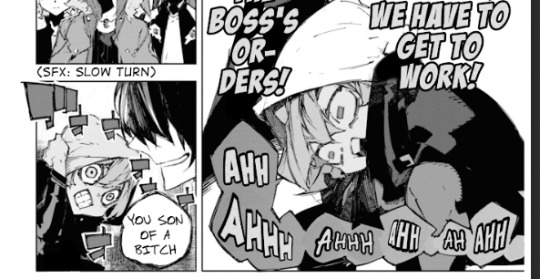
First off, baby? Baby. Also Chuuya's body language in the art is so, like, embarassed/self-conscious teen, except instead of the problem being hanging out with the wrong people in high school its...Mafia-level stakes. Anyway, Chuuya curling up while hiding from his "friends" immediately gives you a sense he is not the one in control.

Dazai-like expression who? Chuuya is putting on a mask so eerily similar...it gives us some great parallels.
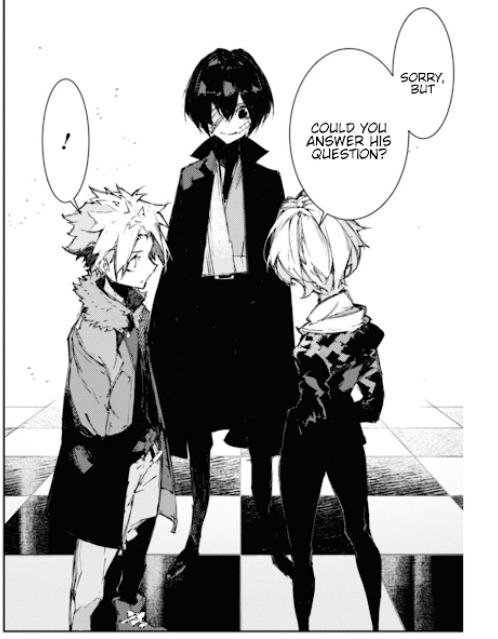
Chuuya unnecessarily apologizing to Shirase? Yeah. Straight from the book.

Insane over Shirase's solid B+ gaslighting. I don't remember if these lines are from the book, but Shirase implying Chuuya's the one "acting like a tyrant" when he literally didn't do anything?? Except ask politely for favors? Throughout the whole conversation he's been the polar opposite. But hey, maybe Shirase's just projecting.
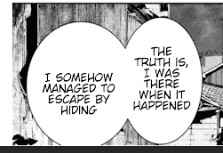
Haha, "somehow".

Nothing to add here except Shirase's body language in this is SO much better than the anime. In the anime he just acted mad and kinda hot-headed. Here he's smiling, acting friendly, giving off those "ofc I'm on your side Chuuya but you make it so hard for these made-up reasons" vibes. Shirase is opportunistic, manipulative, he believes he has control over Chuuya, and therefore his ability.
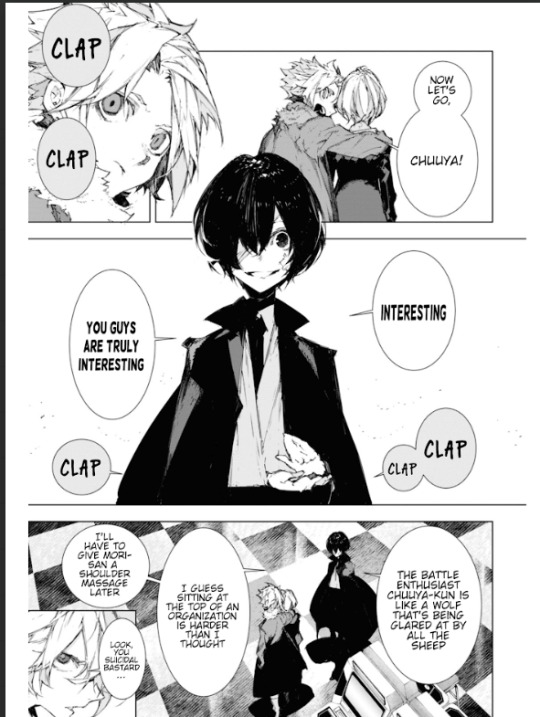
Of course, Dazai can tell immediately what Shirase is doing. That Shirase has more power over Chuuya than Chuuya does over any of the Sheep (which is once again reinforced by the body language. Shirase's arm over Chuuya's shoulders, swamping him. Being physically taller than Chuuya. Chuuya just kind of standing there, passively.
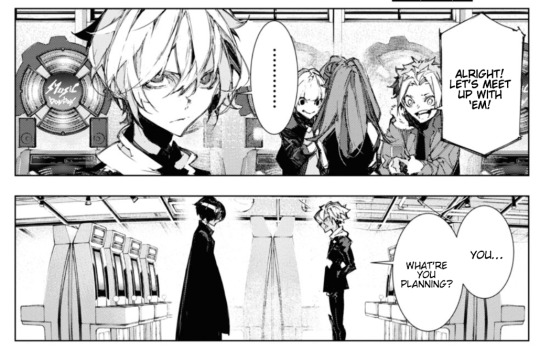
Also despite what Shirase seems to believe, he and the other Sheep are not one bit smarter than Chuuya. They're eagerly celebrating their victory when Chuuya can clearly tell this is some sort of plan on Dazai's part.

Dazai destroying any leverage they had over Chuuya and yet knowing there's some reason Chuuya is doing this anyway. Offering him a choice.
As I've said before (and it's more obvious than ever in the manga) Shirase's using it to gain Mafia territory by getting some of their members captured. I've stated this before, and we do get a confirmation:

The "self defense rule" is something Chuuya explicitly created. To not strike unless provoked. I have a lot of thoughts on this and why but that's not for this post.
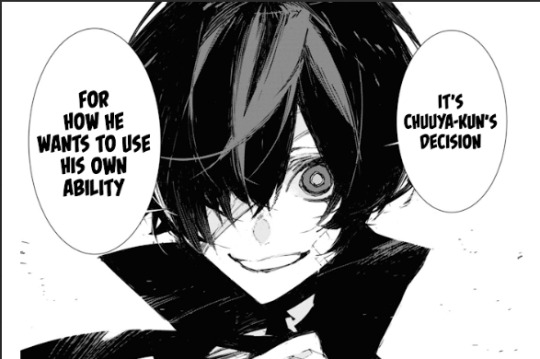
And we have!! Dazai getting pissed off on Chuuya's behalf!! He's scary.
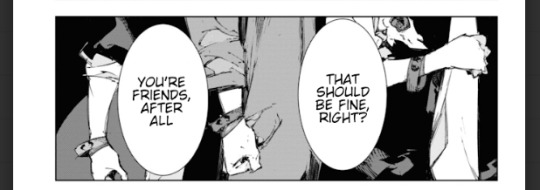
(Spoiler alert: they are not his friends.)

Ahhhh
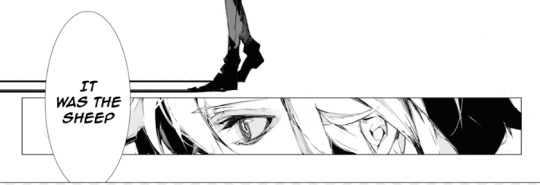
Ahhhhhhhh
Guys I love this chapter. Because on one hand, Shirase, like the rest of the Sheep, have very legitimate fears. They're literally a bunch of kids that used to be preyed on by other organizations, and if Chuuya is not guaranteed to protect them, then...well...they're in horrible danger, really.
The problem is that Chuuya is ready to protect them. But they don't trust him, and it seems they never have. The whole thing is built on Shirase (and probably the others) holding some kind of emotional and social power over Chuuya, therefore guaranteeing their safety. But when that's not longer the case, well, they don't trust Chuuya to protect them. I'm curious how the manga is going to adapt Dazai's whole "meat" story later on because the issue isn't a selfish conflict of interest. The issue is trust, and the lack of it between Chuuya and the rest of the Sheep.
It's like the Sheep built their gang on high school clique rules, and didn't realize Chuuya's not just operating out of a sense of obligation and need to belong, but genuine care. Anyway, that's all I have to say. The art is beautiful.
#bsd#bungou stray dogs#nakahara chuuya#dazai osamu#soukoku#fifteen manga#fifteen light novel#shirase
2K notes
·
View notes
Note
Hey, I got a question for ya.Who THA HECK ARE EOS AND HELIOS?! I tried to found their story but I didn’t managed to find it…And since you’re their creator…could you explain ??? 👁️👄👁️
Thanks for your time (if you founded the time to read this) and (in any cases) have a good day ✌︎('ω')✌︎
ʕ•̫͡•ʕ•̫͡•ʔ•̫͡•ʔ•̫͡•ʕ•̫͡•ʔ•̫͡•ʕ•̫͡•ʕ•̫͡•ʔ•̫͡•ʔ•̫͡•ʕ•̫͡•ʔ•̫͡•ʔ

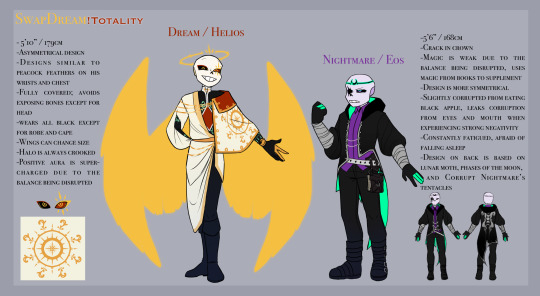
backstory/lore/personalities below the cut! it's. longgggg. VERY long. slkdfjlsdk like over 3k words
Backstory (personalities at the bottom)
Nim was a goddess of emotions, tasked with protecting the worlds made by creators throughout the multiverse. Eventually she yearned to create something of her own, but couldn't make something out of nothing-- so she used herself. She made two beings to keep each other company when she was gone, and used what remained of herself to become a tree to give them shelter.
The beings she made were too young and weak to harness her power in its entirety, so she sealed her power away in the fruits of the tree she became so they could grow into her strength slowly.
The beings were Dream and Nightmare, two halves of her whole.
It continues similarly to Dreamtale-- overtime the tree flourishes and the skeletons slowly grow up together. A village is built nearby and, over decades, becomes a busy town. The child guardians are mostly left alone as the people don't understand them and they keep to themselves, but there are many rumors and myths that develop about the tree they guard. One such rumor is that the tree is the reason the town develops so successfully and quickly. Over generations the guardians are a constant, never aging (truthfully just very slowly) and the mythos surrounding them slowly begins to warp.
People get used to their presence and seek them out more often, and as the details about their guardianship and abilities begins to spread more and more rumors develop.
Dream is outgoing and cheery. He's personable and warm and easy to get along with. The townspeople quickly adopt him like a stray cat, and he's given gifts when he visits and treated kindly. He's called things like "little guardian" and "angel" and the like. He soaks up this attention and praise like a plant hungry for the sun's light and, over time, visits more and more often.
Nightmare is more wary and shy, but strikingly intelligent. He's incredibly protective of the tree of emotions, and rarely leaves. It's more than a magic tree; it's their home and history. A hidden library, the sum of all of Nim's knowledge and life experiences, rests within the tree's broad hollow trunk. There's room enough for dozens, if not hundreds of books, and a place for the twins to sleep and hide away. He's dedicated his life to knowing as much as he can about their long-silent mother and their duties as guardians and is very protective of the knowledge. This makes him more enigmatic to the townsfolk, and people are known to be afraid of the unknown. He's quickly dismissed as the ruder sibling, and shunned. Not that he minds.
Dream isn't as concerned with their history-- he's far more interested in the present and future. He's found himself enamored with the town and how it develops; how he's watched children age and have families of their own, how more buildings are built to spread the town further and further. He knows everyone and everyone knows him.
They are young teens at this point. A couple hundred years old but still maturing and growing. As they've aged the tree has lost fruit; the apples drop to the ground and disappear when they're picked up as the twins absorb them to age into their powers.
But prosperity doesn't last forever, and the tree held no real power over the town's success. Soon the town finds itself in trouble-- a drought, an oncoming war, it's not important. What's important is they cling to their superstitions and fears and try to find a scapegoat. Nightmare is that scapegoat, keeping their salvation from them. They haven't been taking proper care of the tree, that's why there's fewer fruit. It's their fault.
If the town can get to the apples the twins protect, maybe they can use them to help themselves. Maybe they can plant more magic trees to increase their prosperity, or their warriors can eat them and gain their strength. They don't know anything about the tree's true nature and don't care to listen to either Dream or Nightmare when they ask for the guardians' boons.
The townspeople aren't dissuaded, and instead turn to manipulation. If Dream and Nightmare won't give them their blessing, they will simply have to take what they need. The guardians are children, anyway. What do they know about the world and politics of adults?
They know they can't get Nightmare away from the tree, but they can at least lure Dream away. He's offered tea and treats by a trusted villager, unaware it contains a sedative. He falls asleep and they go to work-- dozens of villagers go to the tree and start picking the golden apples. They ignore the black apples, not interested in something appearing 'tainted'. Nightmare tries to stop them but things get violent and he's downed with a blow to his skull. He's still young, weak, inexperienced, and hopelessly outnumbered. He's pinned and forced to watch as his mother's body, his home, is defiled.
The townsfolk didn't count on Dream being resistant to the sedative, however. Despite the amount of sleep-inducing herbs he consumed he's awake within a few minutes. He's groggy and aware something is wrong, but he's up.
Concerned and distraught he's been poisoned by someone he trusted, he returns home to find his brother injured and restrained and the tree devoid of golden apples.
The townspeople have decided to cut down the tree without removing the black apples, thinking that will remove the problematic negativity and they can replant the golden ones to only have positive trees. They're already partway through the trunk, and that's what spurs Dream into action.
They haven't noticed him yet and he starts picking up the apples to protect them-- but they disappear as soon as they're in his arms. They're his power by birthright, and absorbing them is what he's meant to do. It's only natural that his power would want to go where it belongs. At first it's warm and he feels stronger and more aware of what's going on, but the more apples he picks up the more his body aches and starts to burn.
His vessel was never meant to contain this much power this quickly, and as he desperately tries to save the apples it starts to break at the seems. His bones crack, the injuries filling with golden light holding him together, but he doesn't stop.
The townsfolk notice him, finally, and stop cutting at the tree to stop him. But it's too late. He's 'consumed' enough now that he's strong enough to keep them back with a magic barrier. He could stop now, talk them down from their frenzy, but... he doesn't want to. Despite the pain of his body breaking and barely keeping itself together, the power he now burns with is... good. His senses feel sharper, he's stronger, and he's brimming with energy. He keeps absorbing the apples.
His power overflows and can't be contained within him anymore, and golden light seeps out of his spine. The people always called him an 'angel', and this moment is where that myth solidifies itself. They aren't wings, not yet, but the amorphous magic light at his back is enough to make the villagers back away. This is the divine salvation they've been waiting for, right? An angel come down to lead them to safety?
But Dream isn't feeling like the happy-go-lucky child they knew him as. He's feeling an all consuming rage like he has never felt before. His emotions are much stronger than they've ever been, burning inside him. And not only that-- the vague impressions of people's emotions he could always feel are clear as day now. He can see exactly what the people are feeling.
Fear. Anxiety. Anger. And... hope.
That hope stands out to him. It doesn't sting like the other feelings steeped around the tree right now. It's warm and comforting and he wants more.
But first he needs to free his brother. Nightmare is falling unconscious and his vision is blurry, but he recognizes Dream. Dream does his best to heal him, a skill he's been practicing as his magic slowly got stronger. Now, though, his magic is much more powerful. It's raw and out of control and the positivity burns Nightmare with its force, scorching his armrs. Dream stops almost immediately, but the damage is done.
Nightmare was already weak, but now he's on the brink of dusting. The faint wisps of Nim left in the tree uses the very last bit of her magic to turn him to stone to help him recover.
Confronted by the loss of his brother, convinced it was his fault and his magic that did it, Dream shuts down. He goes fully into denial. Nightmare is just resting, he's fine, everything's fine. He can fix everything.
He needs to get rid of the townspeople. They're crowding him and his brother and they need to leave immediately. Shockingly, they obey. Dream is left alone with the statue of his brother.
It's not long before he gets a craving for more of that positivity he sensed. When he returns to the town, suspicious and still angry, he finds everything strikingly normal. Everyone is going about their business as if nothing had happened and he's greeted warmly (if a little nervously). There's more hope coming from everyone and it soothes the ache in his chest.
Dream overhears people whispering about him, calling him the angel again, and he starts putting the pieces together. The head of the town meets with him and suddenly he's not treated like a petulant child, but he's given information.
The town's issues are explained to him. The people are putting their hopes and dreams on his shoulders. There's expectations and they want things from him despite what they have done. And Dream finds himself answering the call, drunk on the power and feeling seen for the first time.
The people weren't acting maliciously, he tells himself. They were just misguided. They didn't know what they were doing, just like how they thought he didn't know what he was doing. He's the guardian of positivity. If they want prosperity and joy again, he can help them. He can guide them to what they want. They just have to stay away from the half-felled tree and do as he says.
As it turns out, the people are more than willing to stay far away from the negativity-steeped tree and follow his orders. They very quickly fall into line and worship him. He has no idea how to lead or manage a town, but nobody dares speak a word against him. Not that they need to. Despite the continuing issues they face, no townsperson can say that they're unhappy with Dream in charge. The opposite, in fact.
Since he came to be with them permanently everyone has found themselves filled with nothing but hope and happiness. They work tirelessly without complaint. Under his guidance the town expands even further over the decades until it's a fortified, bustling kingdom.
But Dream grows bored managing the mortals. He still ages slowly, and now an adult and having overseen a kingdom and its silly politics for generations, he wants more. He's grown properly into his powers and the magic at his back is now properly shaped like wings, like the 'angel' he is.
Nightmare used to speak of the other worlds the books within the tree would describe, and Dream for the first time in centuries seeks out his old home. He finds the books, worn but still intact, and learns of the multiverse and the balance.
It's then that he decides, like the expansion of the kingdom and his influence, to bring his light and positivity to other worlds.
It's another century or two after Dream leaves that Nightmare's petrification wears off. The apples have all fallen from the tree over the years, and he's slowly come into his powers himself. And yet he's still so... fatigued. Like something is sapping his strength no matter how much he rests.
The incident feels like it only happened moments ago for him, and yet he's alone. The library of his childhood is decrepit and the books are in poor condition and barely salvageable. His brother is gone, and when he goes looking for him... the town is a massive kingdom. White and gold and successful, flying golden banners and proclaiming Dream as their patron guardian.
But he's not there, either. Nightmare spends time in the kingdom working as a farmhand just trying to understand what exactly has happened and changed in the time he's been away. It's not easy finding information about his brother that's not glorified, and being an 'outsider' makes it even harder. The myth of the guardian of negativity has faded with time, his status as Dream's brother merely a footnote in the story, and for the first time in his life Nightmare is treated rather... normally by those around him.
It's a couple years later that Nightmare finally comes into his own and realizes the extent of Dream's control over both their original home, and the worlds he's visited since. He remembers reading about the careful balance he and Dream were meant to preserve... but he can tell that something isn't right. Somewhere along the way, growing up alone and worshipped and corrupted by the positivity he was meant to guard, Dream has lost himself. He's 'fixing' every AU he can, making them positive and trying to drive the balance as far in his favor as possible.
Nightmare leaves his home, alone and unsure of himself, and quickly finds himself lost in a sea of worlds that hate him. Due to his efforts to right the balance, he is painted a villain. He's used to it, and yet it still hurts. The hope that it was just that village that hated him quickly turns into the realization he is doomed to be hated wherever he goes, no matter how correct his actions.
The first time he runs into Dream, it seems like everything is going to be okay. They're together again, nothing bad can happen to them now that they're both powerful. But Dream's aura is draining to Nightmare, and their goals are too far apart. Dream's joy at the realization his brother isn't dead quickly turns to petulance when Nightmare insists he stops disrupting the balance and returns the AUs he's altered to their proper states.
They argue, and despite how much it hurts they go their separate ways. Nightmare continues to try and fix things, coming into conflict with Dream every so often, but he's outnumbered again. Dream has hundreds of people in his employ, sent out to AUs constantly to help put them on track to be positive. Nightmare is alone and weakened. Despite working tirelessly, there is nothing he can do to fix things. The balance shifts ever further, and Nightmare grows weaker.
It's years into their conflict that Dream hurts his brother again. He's used to them being on relatively even footing. He holds back against his disadvantaged brother, and Nightmare escapes before things get too bad. It's a song and dance they've done countless times at this point. But eventually, the time comes that Nightmare doesn't dodge in time. An arrow pierces his chest.
He's alive, the wound not enough to outright kill him, but he's comatose. Dream takes him back to his home, an opulent palace in an empty AU he's transformed to his liking. Nightmare can't get hurt anymore like this. Dream can protect him, and when he wakes up he'll convince him to see things his way. Everything will be okay. He always fixes things.
(Nightmare does eventually wake up and more things happen, but i'll save the how and why for later ;) )
Dream / Helios
Hundreds of years old, massively powerful, and incredibly influential. Dream has (peacefully) conquered most major AUs and solved their conflicts. Beloved by all and he knows it, he's egotistical and used to getting what he wants. And if he doesn't get what he wants... he finds a way. He's entitled and arrogant but also completely assured in his power. He has no need to gloat, he's quite confident in his status and abilities. But that isn't to say he doesn't like praise; he lives for it.
He's generous and well-intentioned, but also fully capable of justifying the means to get his end. If an AU can't be fixed it's either cordoned off or allowed to be destroyed. He employs many many people from many AUs to do his bidding, including those from AUs that would be considered 'negative'. If there's only one person left in the AU, removing them and giving them a better life is the next best way to fix it.
He doesn't have friends, not really, but his close confidants are Blue and Strike. He collects injured mythological creatures from AUs and rehabilitates them at his palace. He considers himself a patron of the arts, and aside from hiring people to help spread positivity he also hires artisans to live in his palace and fill it with art of all kinds. Tailors, sculptors, painters, writers, singers/musicians, and more.
He has many hobbies he's picked up over the years, but enjoys singing the most. He can fly with his wings, and is strong enough to carry someone along with him. He can change their size and shape depending on need.
He's very self conscious about the golden cracks all over his body, considering it a symbol of his weakness when he was young. He wears full coverings at all times (except his skull), and would only show the cracks to someone he truly trusts and cares for.
He's very skilled with a bow and rapier, but prefers to leave the fighting to his guards. He's very clever with his words and can be a skilled manipulator, but is equally capable of lacing his words with magic and forcing people to follow his will. He's very in-tune with souls and can manipulate even the slightest bit of positivity he senses, and there's a few people around his castle that are effectively his puppets due to their disobedience.
Nightmare / Eos
Cynical and exhausted. He's a workaholic; he doesn't have time to rest, he has to live up to his responsibilities. He rested enough as a statue and he can't afford to stop for even a moment. He wants nothing more than to have everything go back to the way it was and be close with Dream again, but worries the passage of time and what happened when they were young has put an irreparable crack in their relationship. The Dream he fights now is nothing like the Dream he knew when they were young, and he struggles to grasp that disparity.
Dream however can't help but recognize that Nightmare has barely changed. He's still shy and a bookworm. He's vilified and despised by most around him despite his good intentions, and continues to stand up for what he believes in in spite of it. He knows he will never be the hero of the story, but fights anyway.
He's slow to make friends and even slower to fully trust someone. He yearns to be understood and treated like a full person and not as a scapegoat for fears and misunderstandings. He's fighting to right the balance as is his responsibility, but all he really wants is to settle down and rest. He gets easily attached to people that make him feel safe and comforted.
He grew into his magic slowly as a statue, but is still adjusting to the changes even years later. When he's overwhelmed by negativity it can result in him leaking corruption from his sockets and mouth.
He's weakened from the balance being disrupted, but makes up for it with alternative magic he's learned from books. He has a passion for bookbinding and book restoration and has lovingly recreated and repaired what he could from the tree's library. He thinks it's very important to preserve Nim's history and live up to his responsibility as a guardian.
Not as skilled with a bow as his brother, but a decent swordsman with a sickle or scythe. He fights his own battles and eventually gains a team of close friends to support him.
290 notes
·
View notes
Note
I’m bored and I really enjoy your opinions on Disney, so I thought you might have something interesting to say to get my brain ticking. I came across a post on Frozen and I was like, “Ah, a perfect starting place for dropping you an ask.” I’ve never really been that bothered by Frozen and I don’t know what it is that I’m just not fond about. Maybe it’s that I dislike the characters? Maybe it’s that they didn’t really have any established rules for the way magic worked in that universe and thus had anything they wanted happening? Maybe it’s the twist villain? I don’t know, it’s probably just the characters that they tried to make so cool and girlboss!
Elsa is made out to be this awesome protagonist that is never in the wrong and that grates me. She has flaws, but the film doesn’t act like they’re flaws. She runs away out of fear and shame for not being able to control her powers, but then two seconds later she’s singing “Let It Go” and making giant ice castles and bringing snowmen to life?! And “Let It Go” is super annoying for the fact that Elsa starts off worried and upset (fair enough, she’s just ran away from her home, her kingdom, her sister whom she hasn’t seen in years, she lost control of her powers) but then immediately turns round and is like, “Actually, it’s not my fault and I’m fine as I am and I don’t need any of those responsibilities!” Which would be fine, but she also finishes the film with the same attitude!
Anna, too! Naive and optimistic and perhaps a little too trusting, she never realises that even if Han hadn’t turned out evil, Elsa had every right to be worried over their marriage. She never realises that it’s partly her fault for revealing Elsa’s powers (and she definitely doesn’t apologise). There’s a lot she doesn’t realise, and the only lesson she takes away from it all is that Christoff loves her instead of Han.
Oh my days, I’ve just realised how ridiculously long this has gotten, super sorry! Have a lovely day!
Let’s do this! For fun!
1. They don't need to establish exhaustive rules for how magic works in their world.
Red Riding Hood doesn't explain how the Big Bad Wolf can talk-it just explains that he can. Cinderella doesn't explain how Fairy Godmothers work, or why the spell should only last until midnight—it just explains that she casts one, and it does only last until midnight. Beauty & the Beast does not explain how, after The Beast has died, the "breaking of the curse" could bring him back to life. After Belle confesses her love, he should just go from dead beast to dead human, for all the explanation they give.
Beauty & the Beast also famously refuses to explain (explicitly) why all of the household were cursed, along with the castle and the Prince. But what it does explain is, "there's a curse, it was put in place because of a defect in the Prince's character, and there's a time limit on it's ability to be removed, which can only happen if the defect in his character is overcome."
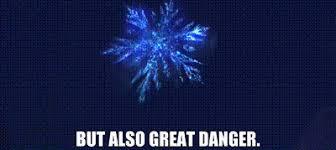
The whole point of having magic in the story is just as a tool...to create a plot. You don't have to explain everything; you just have to explain what will affect the characters. So, Frozen says, very plainly in the beginning: "you can either be born with magical powers or cursed with them in this world, and trolls are the experts on how magical powers work. The way Elsa's specific magical powers work is, they're beautiful, but powerful, and they're tied to her emotions. Therefore, if her negative emotions control her, her negative emotions control those powers. Also, if you're struck with magical powers in the head, the effects can be removed with memory alteration. If you're struck with magical powers in the heart, the effects can only be removed by an act of True Love.
Also, here's an explanation of what counts as 'True Love." They actually do way more explaining than the average fairy tale. And they set you up really nicely to receive that explanation by having the opening scene be a song that describes Ice Magic as “beautiful/powerful/dangerous/cold/ice has a magic can't be controlled.” Etc.
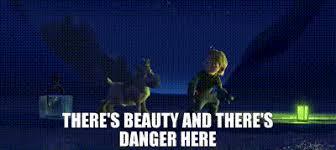
If you were wondering what limits there are on Elsa's powers, and whether or not she can just make anything out of ice, and how it's possible for her to bring inanimate snow to life
—well, you're focusing on the wrong things for this kind of story.
It's not that important for a fairy tale like this one. In a superhero story, limitations on powers would be important. Because the point of a superhero story is, "how am I going to take selfless responsibility for what I'm able to do?" And if you don't know the boundaries on "what I'm able to do," then you can't communicate that point clearly. That's why we need to know that Superman can see through just about everything, but not lead. That's why you need to know that Elastigirl can't stretch in the cold. You can't know how to take responsibility for your abilities if you don't know what they are and are not.
But Elsa? The point of Elsa having powers is not as a metaphor for her unique skills. That's what it would be in a superhero movie.
Like, in superhero movies, Spidey's ability to stick to walls is supposed to be a reference to like, your ability to...l don't know, draw really well. How is Spidey going to use his ability to stick to walls for the good of others = how are you going to use your ability to draw for the good of others, because it's something special and unique to you, you have something to offer, are you going to use it selflessly, etc.
But for Elsa, that's not what it's about. Her powers are just a metaphor for how what's going on inside of her effects everyone around her, relationally. And it's still relatable. But not in a "skills" way. Just like all of us non-superpowered people: "if you let fear control you, you'll hurt everyone around you. But if you let love cast out fear, you'll love and be loved."
That's what's so good about this movie. When you look at it like that, you realize the powers aren’t the point.
Elsa isolates because she thinks that'll keep her from hurting everyone (fear controls her) but actually, by isolating, she's still hurting everyone-nobody in the kingdom gets to see their beloved ruler, and her sister is hurt, relationally, and feels unloved and shut-out, enough to trust the first scoundrel she meets-etc. See how the powers just make the story interesting, but they're not the point of the story? If Elsa's powers were replaced by "frantic outbursts of human temper" the story could be told in a lot of the same ways. But that's a post for another time.
So I don't think you disliked it because of the powers not being "established." "Whatever they wanted to have happen" did not happen, in the story. They laid out the rules that were relevant—“if fear controls you, it'll lead to great danger/but an act of true love can thaw a frozen heart."—and then they followed those rules in an interesting and consistent way.
2. The "twist" villain worked perfectly for the story.
A good villain is supposed to be the opposite of whatever your story's message is. Frozen's is, "Self-Sacrificial Love Casts Out Fear." Elsa is afraid she'll hurt everyone around her, and afraid that makes her unloveable-so she's a control freak over her circumstances. Anna is also afraid she's unloveable-simply because she's shut out and unknown-so she's always trying to control who she keeps in her life. Hans is both "unknown" and "controlling." He's "unknown" in two ways—1, nobody sees him in the shadows of his brothers in his own kingdom, and 2, nobody in Arendelle "knows" his true nature, especially not Anna. But the difference is, where our heroes don't like being unknown, Hans does, and uses it to his advantage, because he's also "controlling." But unlike our heroes, who learn that "control" is not the way to love, Hans is willing to do anything to stay in control. Which is, always, rooted in fear, too. Hans is just afraid he'll never get a throne. So. You see that he foils the two main characters perfectly.
But the main point of Hans is that he's not self-sacrificial, he's self-serving, which is the opposite of what the story claims "True Love" is.
Why's the "twist" part important? Because he uses the main characters' fears as a weapon to serve himself, and he couldn't have done that, for these two particular characters, by being anything but a liar. Anna is afraid she won't ever be loved, so he pretends to love her to get something for himself. Elsa is afraid she'll hurt everyone, so Hans pretends to be protecting everyone from her. And honestly, that's another core of the movie-love that is self-sacrificial, true love, can't be separated from truth. Anna can't really "truly love" Elsa in a way that HELPS Elsa feel loved if she doesn't know Elsa's flaws. Elsa can't "truly love" Anna if she's refusing to know Anna by always shutting her out. And Hans comes along and doesn't let himself be "truly known." Perfect.
So, the movie says "Self-Sacrificial Love Casts Out Fear" and Hans, the villain, says, "Self-Service Uses Fear As a Weapon."
So I don't think you disliked the "twist" villain. Because it wasn't just an empty "shock-jock, look how edgy we are, to make the Prince the bad guy" move. It was the right move, for this story and these characters.
3. I think your definition of "so cool" and "girlboss" might be different from what l understand those terms to mean, because none of the characters fit those descriptions.
Anna (as we understand her throughout the story) is introduced like this:

And she's constantly dropping stuff and getting into awkward social situations-and she basically makes zero correct decisions, for the entire adventure. Tries to fight wolves like a girlboss-and instead accidentally knocks her guide out of the sleigh and has to be thrown to safety while she ruins his livelihood. Tries to climb a cliff with zero experience-looks ridiculous and falls. Tries to talk her sister into lifting a curse and insists that she knows best because her sister would never hurt her-gets crippled, because her sister absolutely does hurt her, and totally fails. Tries to marry a handsome prince-really bad judgement of character, totally duped, basically would've died without help from the weakest and most mentally-confused character in the movie, Olaf. The only "girlboss" moment you could argue she had was punching Hans in the face at the end of the movie, and I would argue that that one moment, in the face of all her failures and humiliation throughout the movie, and in the face of him as a vile villain? That moment is okay.
Also, the whole way they pace that moment is still in-character for Anna. It's still like she's not doing the "dignified" thing. She delivers her little one liner, "the only frozen heart around here is you," and then turns around to walk away with her nose in the air, like she's
"above it all." Which frames the moment where she turns around and punches him like a joke. It frames that moment like it's a satisfying, but still "not decorous, not dignified," thing to do. It would've been "cool" and poorly received if Anna, the character who's always jumping into doing the emotional, awkward thing, had suddenly become the bigger person and risen above her hurt in that moment.
So instead, she punches him. And whatever. He deserved it, blah blah blah. The point is, even that moment isn’t supposed to be strictly “cool” or “girlboss.” It’s just supposed to be “in-character funny.”

See, usually a "girlboss" character knows exactly what the best thing to do is in a situation, and does it well. Or, she gets knocked down, but consistently gets back up and hits harder. Anna does not do any of those things. She keeps trying when she fails, yeah-but it's not because of an inner strength, it's because of an inner weakness. She keeps pushing because she's desperate, and insecure, not because she's awesome and never-say-die. Eventually, after Elsa strikes her and Hans betrays her, Anna does give up. She tells the snowman "we won't (come back.)" after Elsa strikes her. She tells Olaf she doesn't know what love is. It's not until she learns that lesson that anything she tries to do works—and she gives herself up to do it. And that's finally a moment of strength from her, not weakness. As for "cool"-gimme a break.

There's nothing "cool" about Anna. Anna's not good at anything except, at the very end, self-sacrificially standing in front of a sword and getting one punch in on a villain who's already disarmed, defeated and probably slightly concussed anyway. She's not supposed to be "cool" or "girlboss." She's supposed to be "Desperate to Love and Be Loved." And that's what she is, perfectly. "Desperate" is not a characteristic that fits the definition "girlboss" or "cool."

But maybe you just meant "Elsa is so cool and a girlboss." Okay, well, again, depends on what you mean by that. If you mean "having superpowers are cool" okay, well, are they? Is that what the movie is telling you? Because powers basically ruin all of Elsa's childhood and life until the last 3 minutes of the movie. You could be like "come on, she can make snow and ice monsters, glitter gowns, and an entire palace just by dancing. They totally tried to make her 'cool." That's like saying Simba's ability to eat bugs and belch and fight with Nala is "cool." She does all those things at her "Character in the WRONG" moment, in the story, just like Simba living in the Hakuna Matata jungle. Therefore the movie is not trying to tell you that Elsa is cool, it's trying to tell you that Elsa is wrong, but you can understand why she's wrong. You can understand why she feels triumphant for a moment-and then the movie shows you that triumph is misplaced.
I mean, she's taken out by her own falling chandelier. Every time she's confronted with a problem, she runs away. When she gets into "battles of wits," she says the wrong thing, or the shy, shut-down thing, not a girlboss one-liner that shuts the other person up. Elsa's not cool either. She doesn't have the answers, she doesn't save the day-she gets saved.

Both of these characters are desperate, open wounds-—they're needy and they're in the wrong, each in their own way, for the majority of the movie. They're weak, and they have to learn to find strength in love, for most of their story. There's nothing "girlboss" or "cool" about them.
I think maybe what some people make the mistake of is noticing the Frozen mania, and the fact that the two main characters are girls and one of them has superpowers and they other doesn't get with a Prince, and then they get the impression, from that, that the characters are "cool girlbosses." But like...that's like saying Dory from the first Finding Hemo movie is a girlboss. She's so totally not. She's a wreck. A funny, appealing, sometimes-relatable-human wreck. And a good character, but the hype doesn't change who she is, as a character. And who she is, like Anna and Elsa, is just a good character.
4. Elsa does not finish Let it Go with an "I'm Fine As I Am" attitude, and she doesn't finish the movie that way, either.
She finishes "Let it Go" with an "I'm fine up here, isolated from everyone," attitude. And then the movie very quickly proves her wrong by having Anna show up and reveal to her that no, actually, she is not fine up there, because the person she cares about most can still find her and be hurt by her, and the whole kingdom is still reeling from the problems she ran away from.
At the end of the movie the only thing I can guess you got the impression that she's "fine as she is" from was the fact that she's using her powers again.

But like. Elsa's whole problem was never her powers. She wasn't supposed to learn to stop using them. She was supposed to learn to stop living in fear. Instead, she was supposed to lean on love-love that sacrifices for her, flaws and dangerousness and all-and stop trying to control her image and what everyone knows about her.
Because in trying to control what everyone knows about her, she was controlling whether or not they loved her or treated her like a monster. And even running away and singing Let It Go was still an effort to control everything-by not being around people who could treat her like a monster or be hurt by her. Instead, accepting that she might hurt people because she can't always control everything, and trusting that they'll still love and forgive her, was her character arc.
She lives by faith in sacrificial love by the end, not by fear. That's the arc. She does that perfectly.
It was never, "I'm fine as I am." Because the point was never "there's* something wrong with me." It was, "I don't need to fear a lack of control, because true love covers what I can't control." That's all.
4. Anna does communicate to the audience that she's sorry and willing to understand the reasons behind Elsa's secrets.

The lesson Anna takes away from all of this is not "which guy loves me." It's "what is love?" And you know she's learned that because she demonstrates it. If Anna had died-frozen forever-or been cut down by Hans' sword, you realize that Elsa would never have been able to repay that gesture, right? But Anna still made that choice.
Even though it meant Elsa would never repay her. And the point is — excuse me, I know this is long enough, but I feel like you're missing out on something wonderful here—
Anna could have left Elsa to be killed and ridden off into the sunset with Kristoff.

They make it very clear that that is her goal when she stumbles onto the ice, free from the room Hans trapped her in. Elsa is no longer her motivation. She isn't looking for Elsa. She's not trying to get that love she's looked for, from Elsa, in that moment. She's trying to get it from Kristoff, not just for her emotional need-but for the "breaking of the curse" that's killing her in the moment. That whole scene where she realizes he loves her-truly loves her, because he fits the description Olaf gives-is in there to communicate to the audience that he could save her. He could give her what she needs.
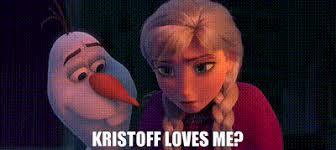
And the reason that's important is that it proves that this is character development: when she chooses not to go to Kristoff, and to go to Elsa instead.
Because it's her, choosing to turn away from the person who could give her something (even if it is "love") and to turn toward the person who can't give her something (Elsa.) Who has repeatedly failed to give her something, for their entire lives.
Anna at the beginning of the movie would've run to Kristoff. That was the whole point of Hans, when it comes to Anna-he represents someone who can fulfill a need in Anna. But when Anna turns away from Kristoff and runs to save Elsa instead, Anna is demonstrating what she's learned —that love isn't about her own needs. It's putting someone else's needs before yours. She stands between Hans and Elsa, with the full expectation that she's not going to get anything out of it, not even a guarantee of E/sa's love in return. And her own needs will NOT get met if she puts Elsa's first.

And that's what she does. Whereas, at the beginning of the film, Anna would not have done that. Because that's not what she thinks love is. She hasn’t realized that yet.
She thinks love means closeness. And that does come with love. But that's not love. Love is, like Olaf says, putting someone else's needs before yours. But the whole movie, Anna is not working to put Elsa's needs before her own. She's working to change Elsa's mind, now that she knows the truth, so that she and Elsa can be "close again." She's climbing that mountain and arguing with Elsa, because she thinks that all that stood in their way before was this secret that's been uncovered. And sure, Anna has always been willing to “be there for” Elsa, but you have to see that Anna wanted that to come with Elsa being there for her, in return.
Which would be nice. But it's not true love. True love is being there for someone even when they refuse to be there for you. Because that's putting their needs before yours.
Thanks for the super long ask! That was fun! I hope you enjoyed reading as much as l enjoyed writing-I think sometimes we judge Frozen by the mania that followed, not the good quality that actually caused the mania, and deserved the mania, though. Anyway 😂

Guards! Take them away! Back to the theater with you! Watch the movie again!
#just kidding#this was fun#thanks for the ask#asked#answered#frozen#Elsa#Anna#Disney princesses#Kristoff#frozen 1#frozen 2013#meta#analysis#storytelling#writing#characters#character analysis#frozen mania#Queen Elsa#Queen Anna#Princess Elsa#Princess Anna#Olaf#Sven#Hans of the southern isles#Hans#trolls#Disney critique#frozen hate
106 notes
·
View notes